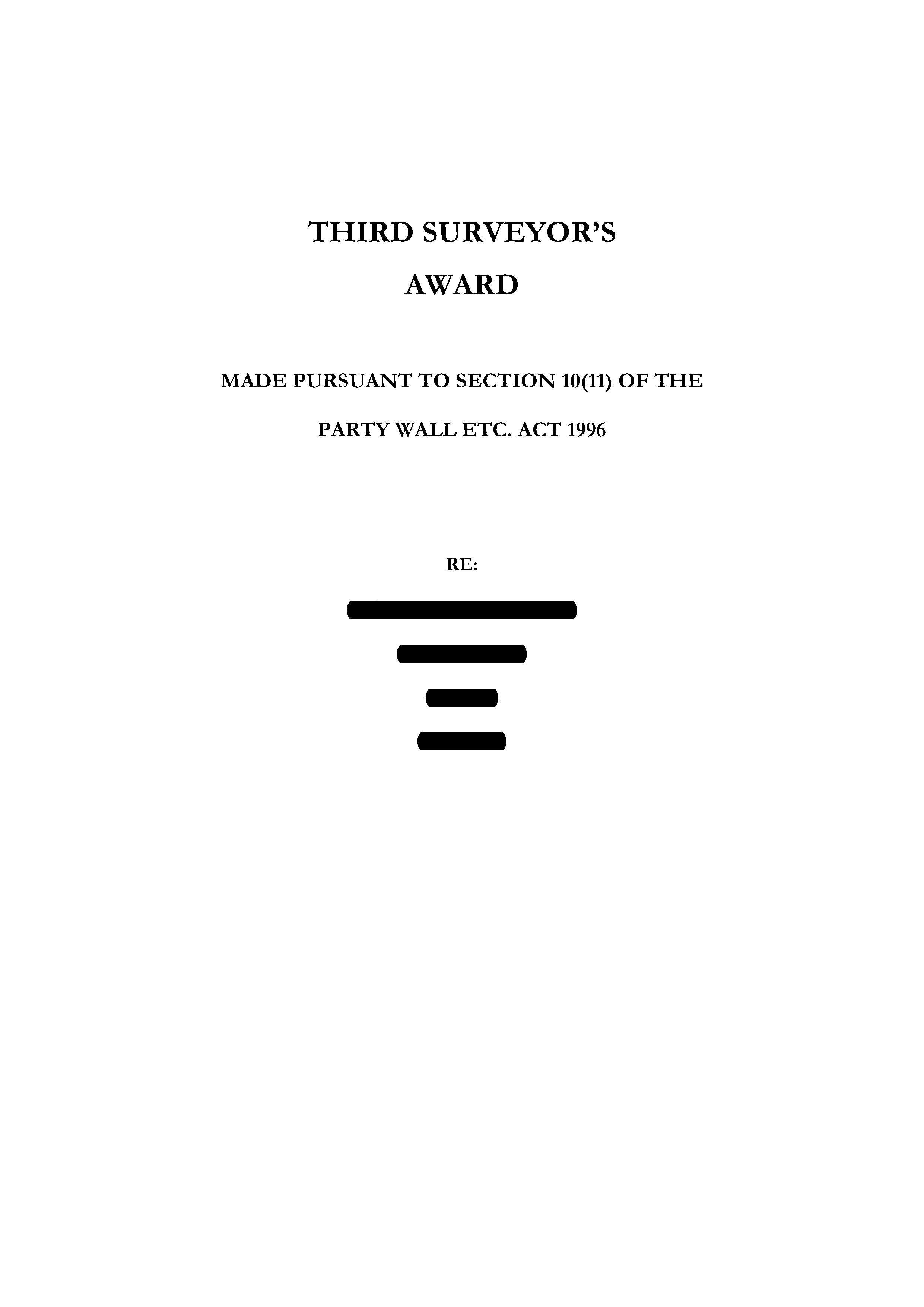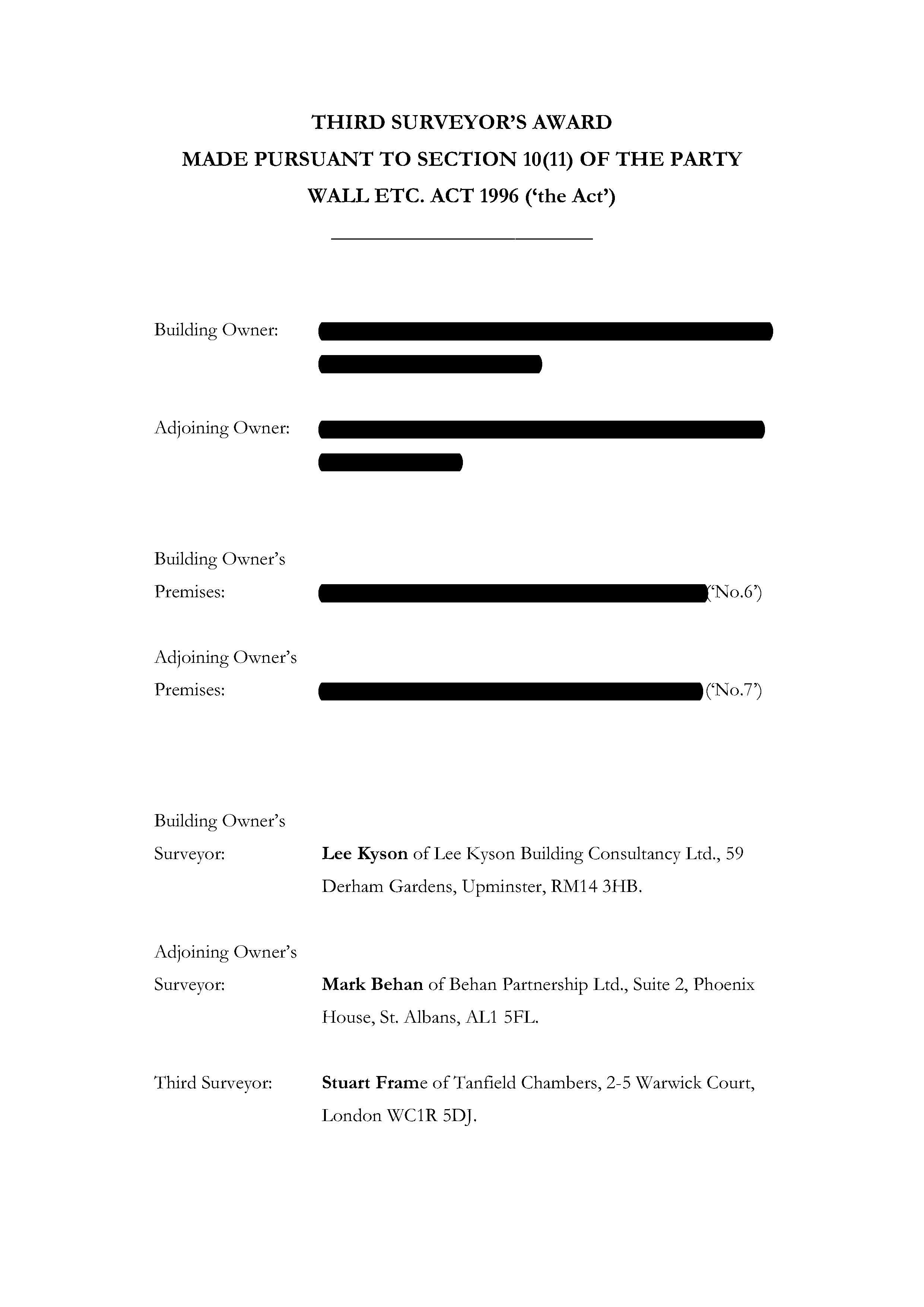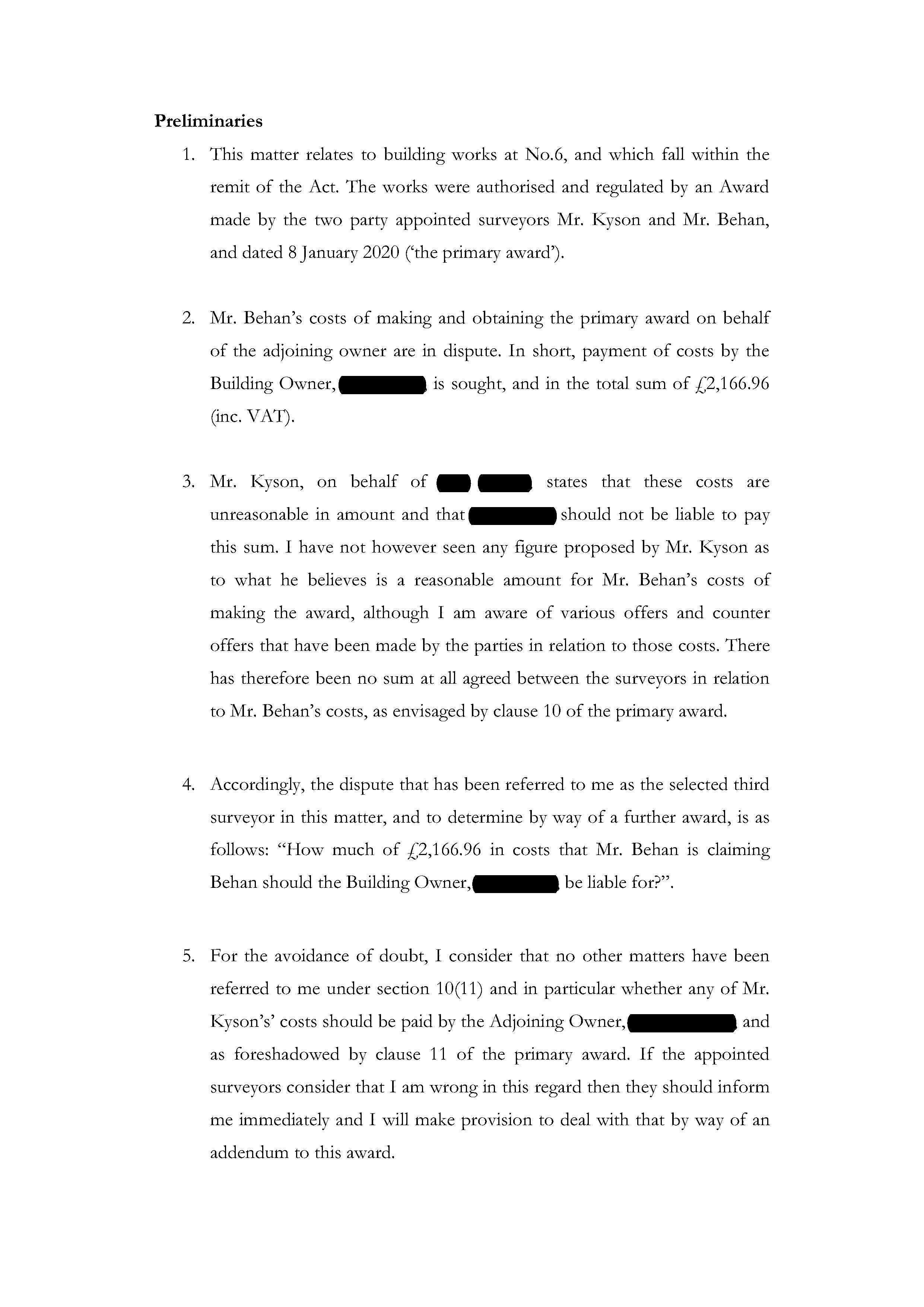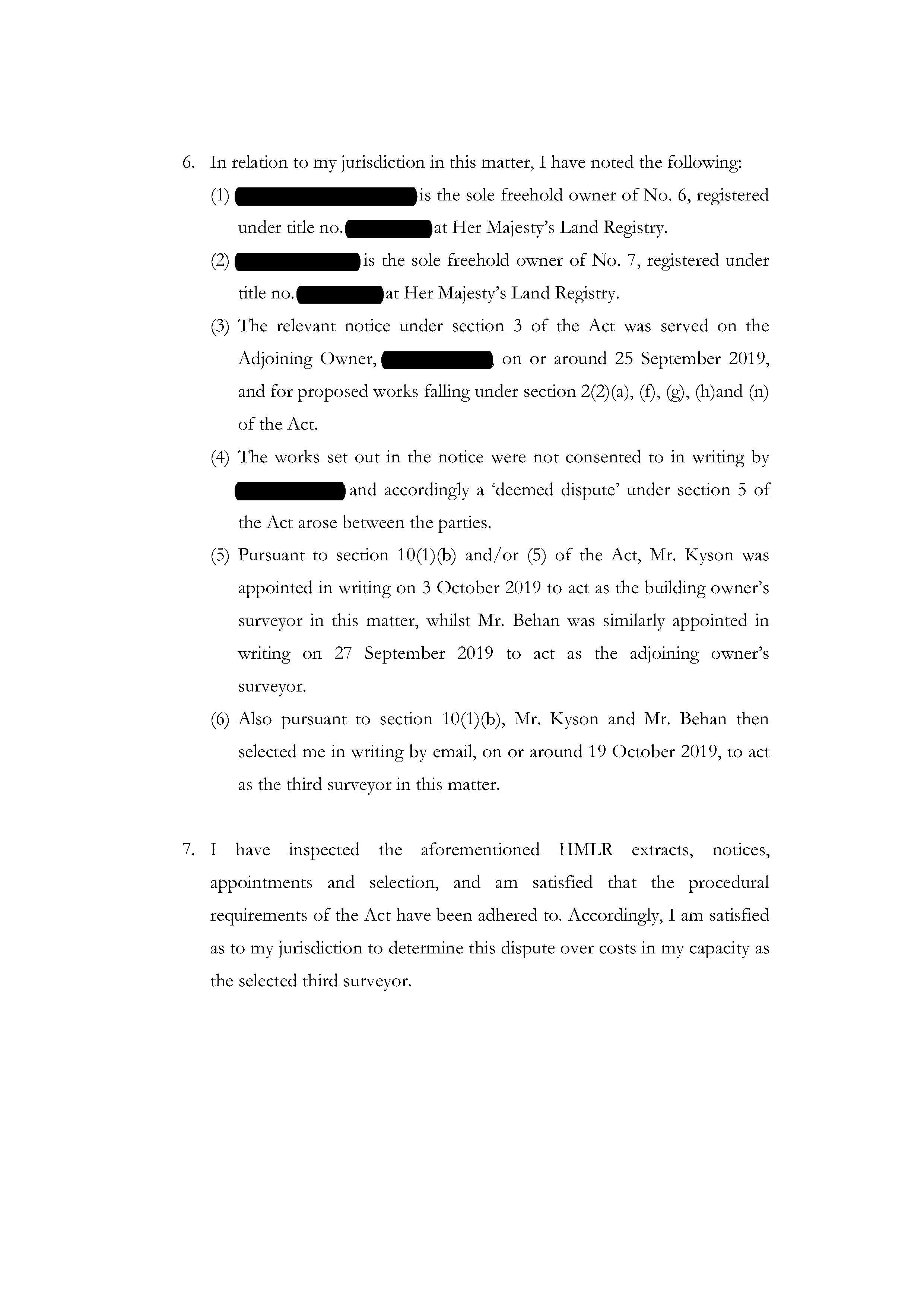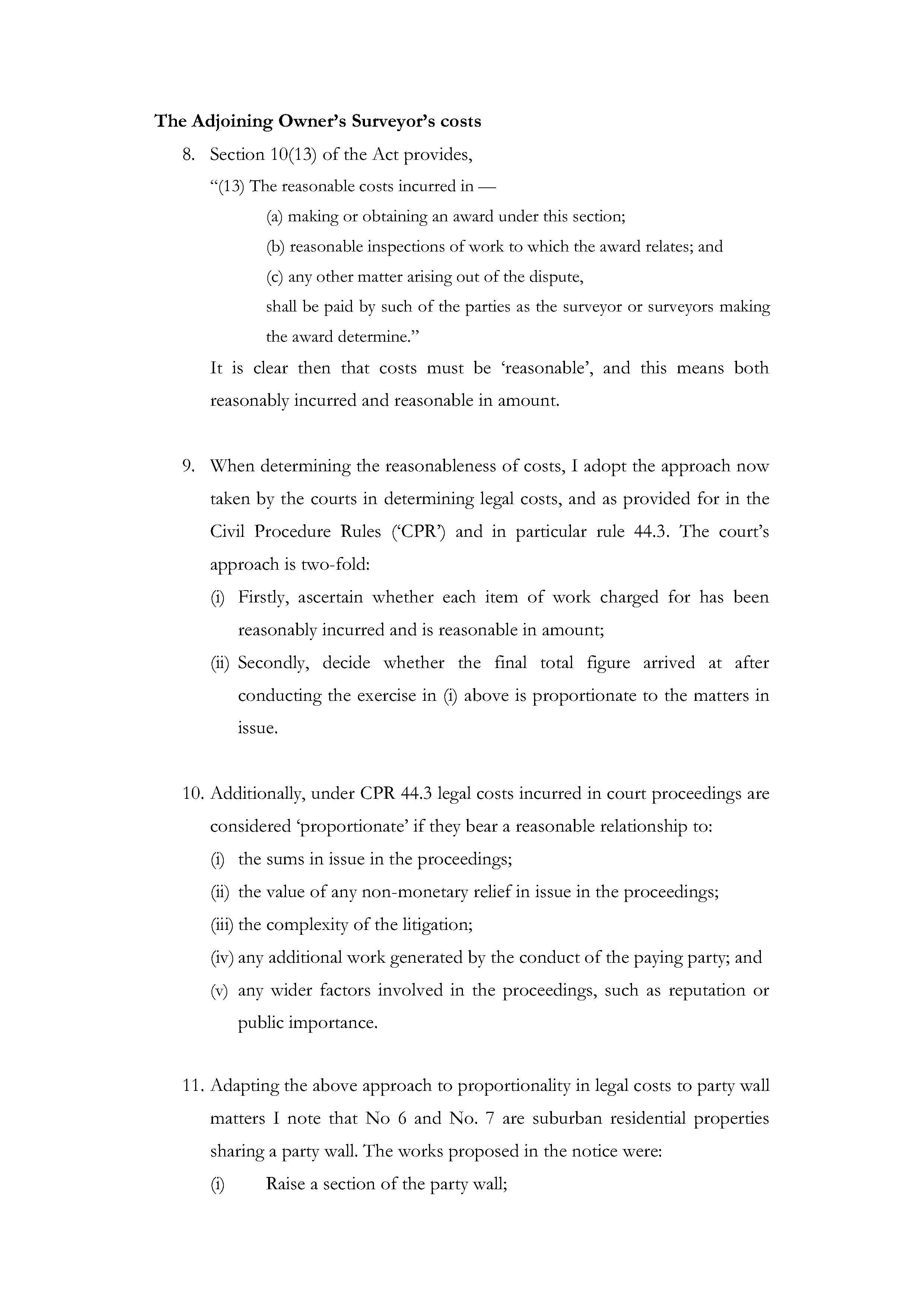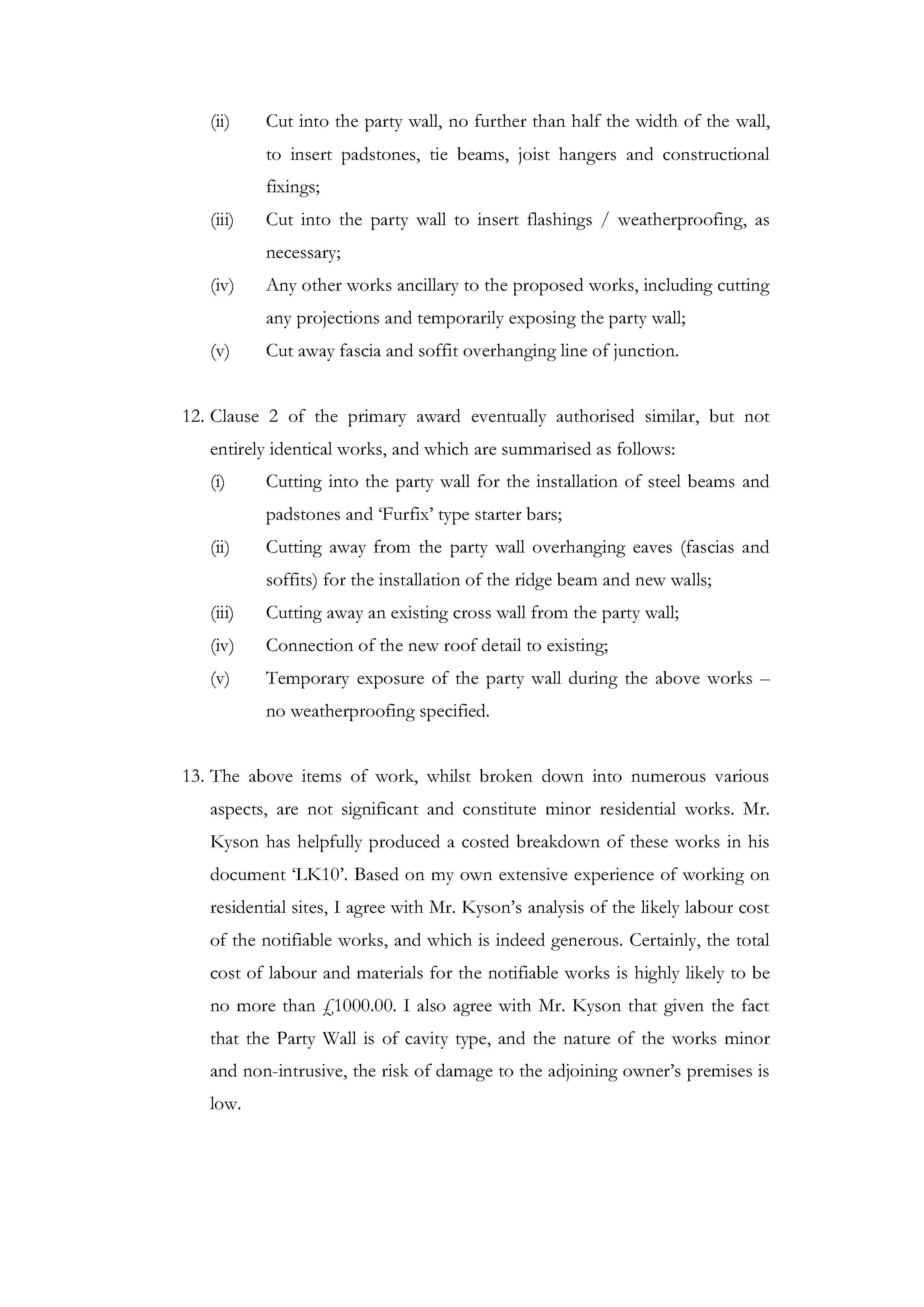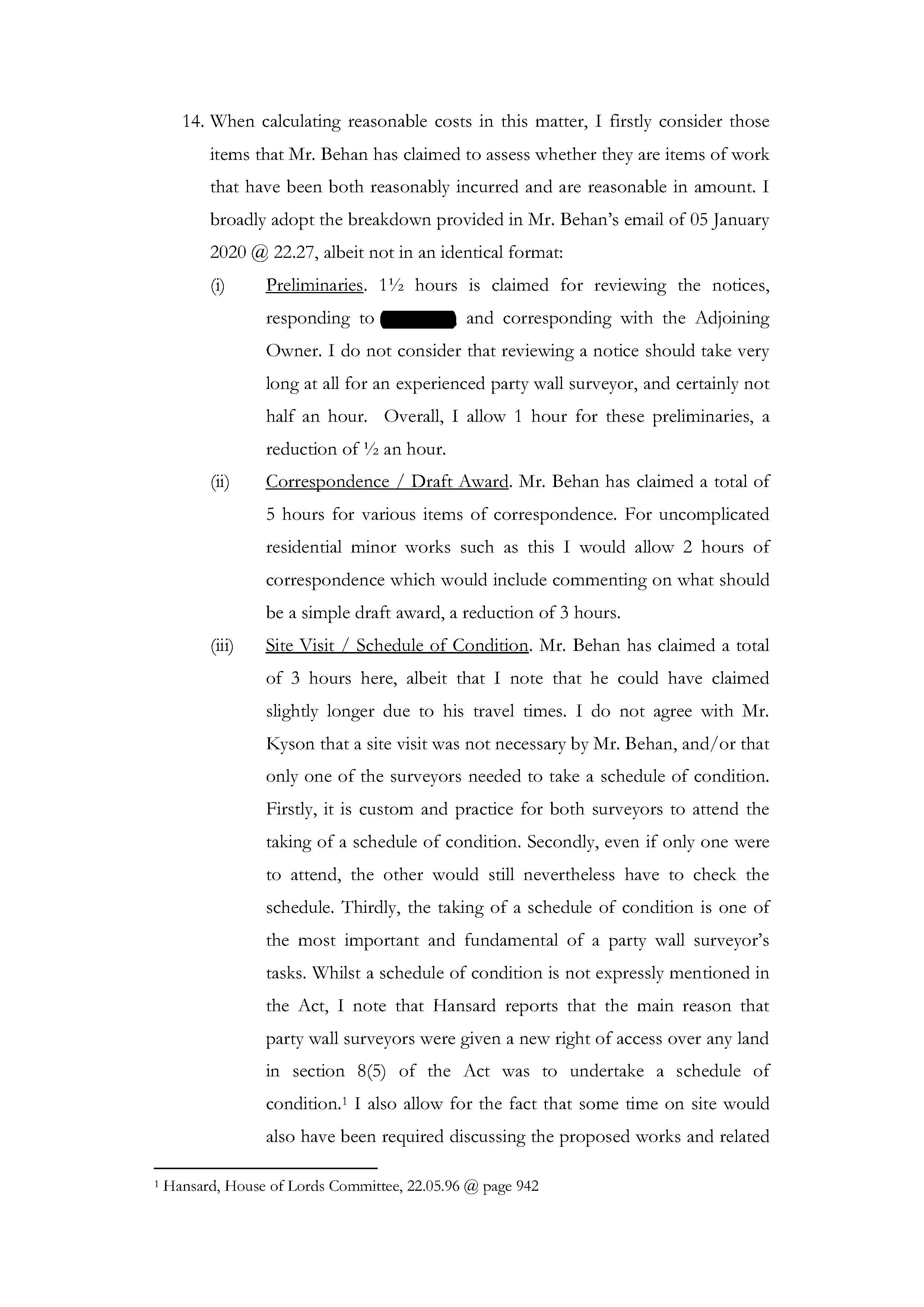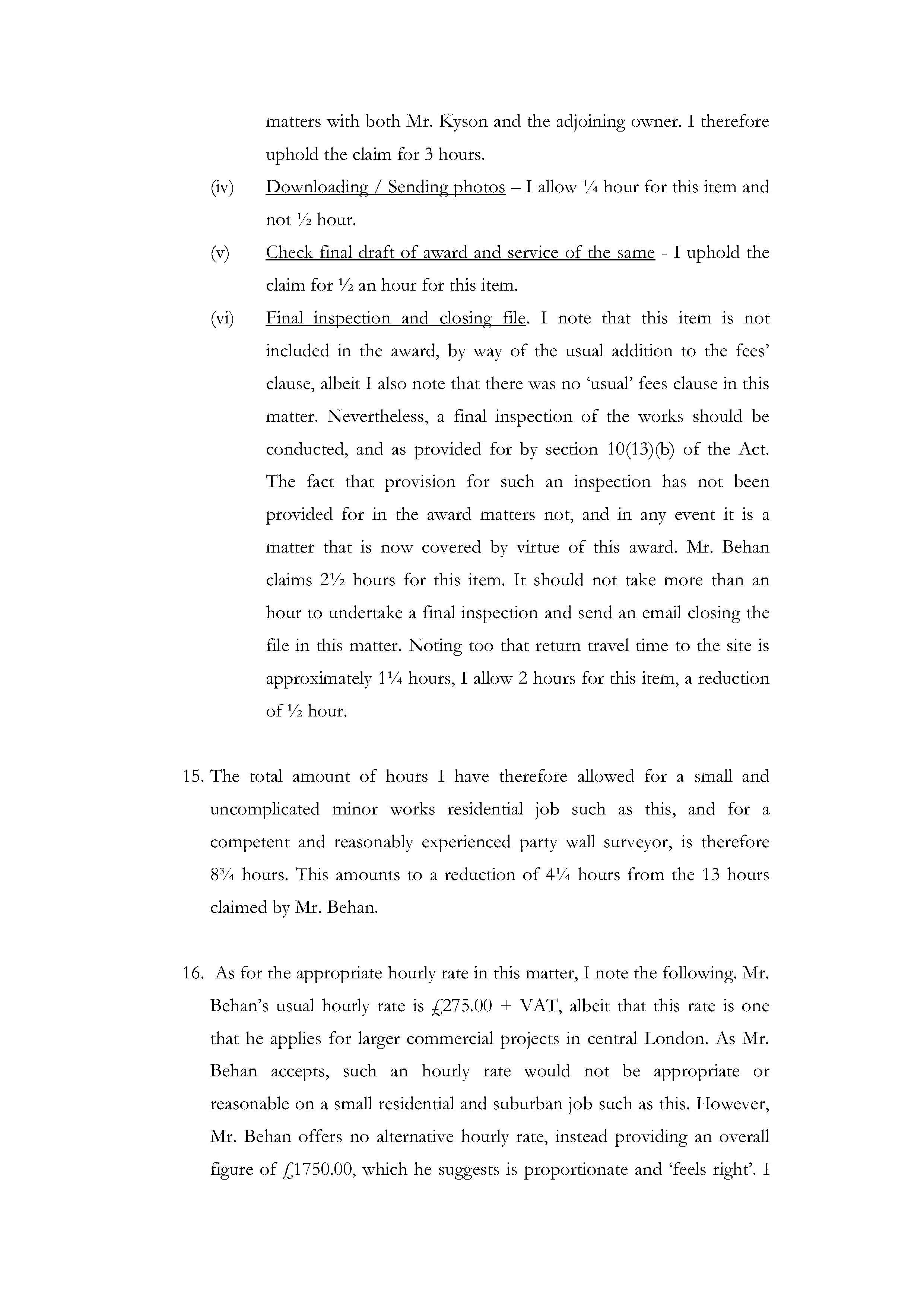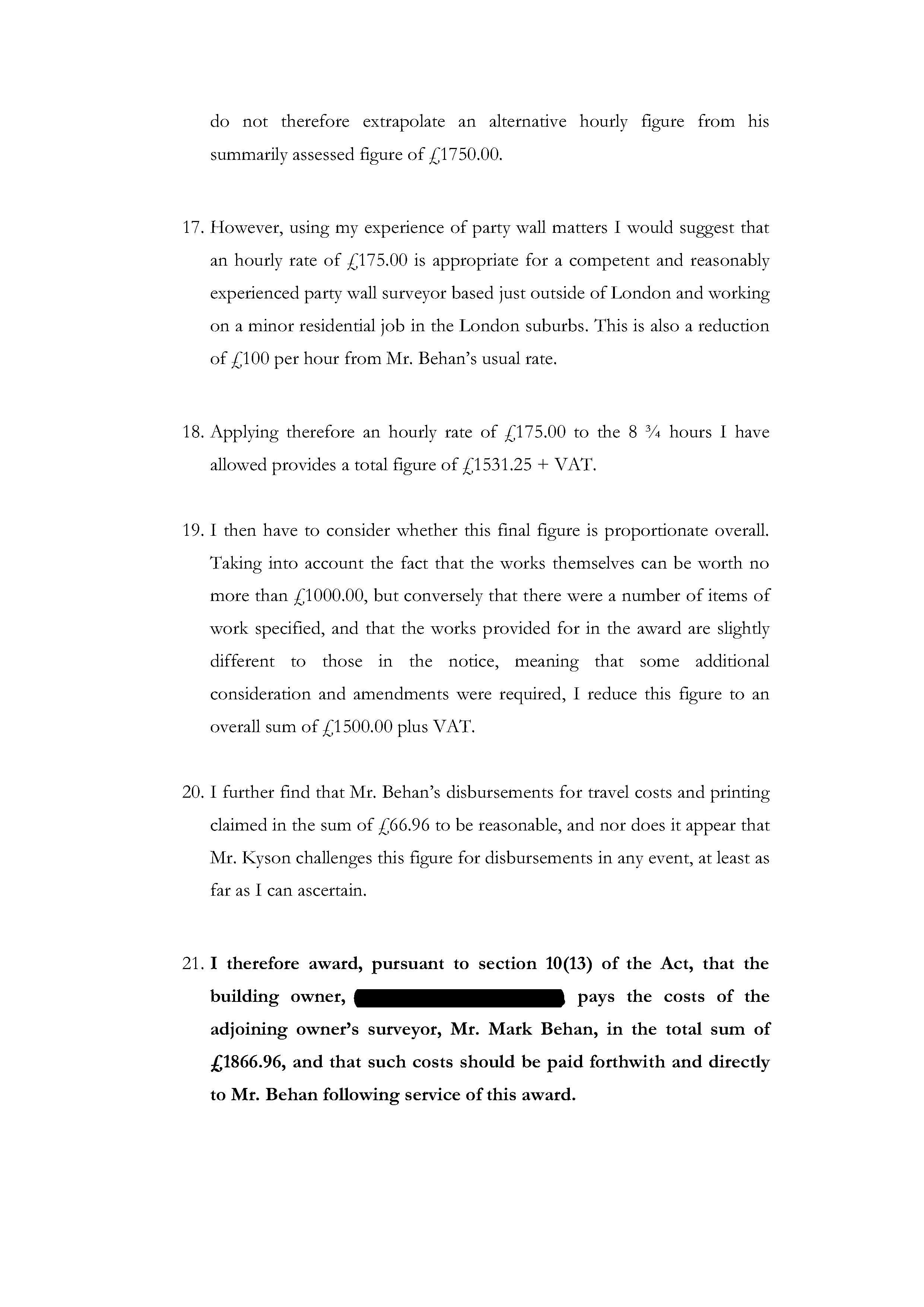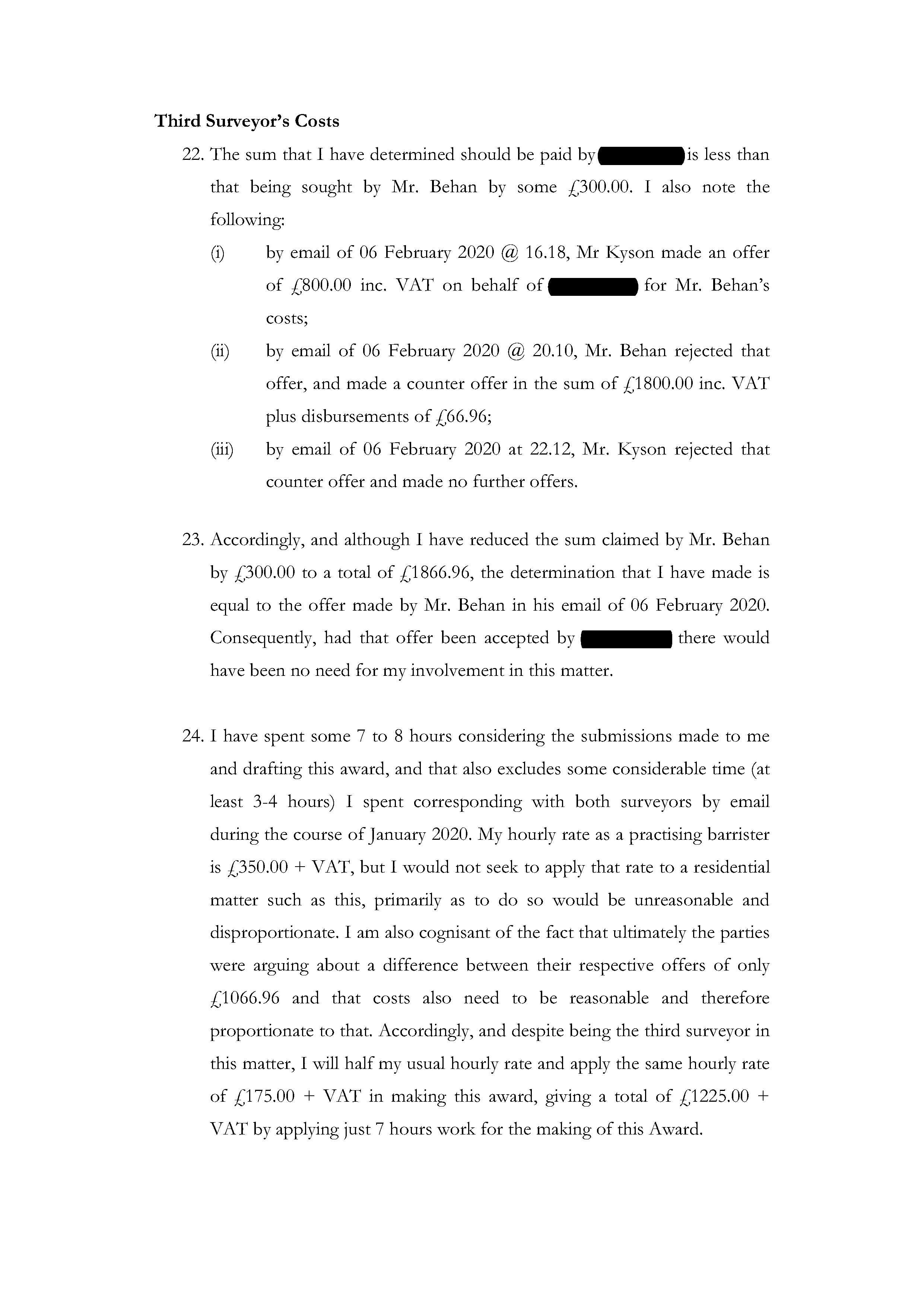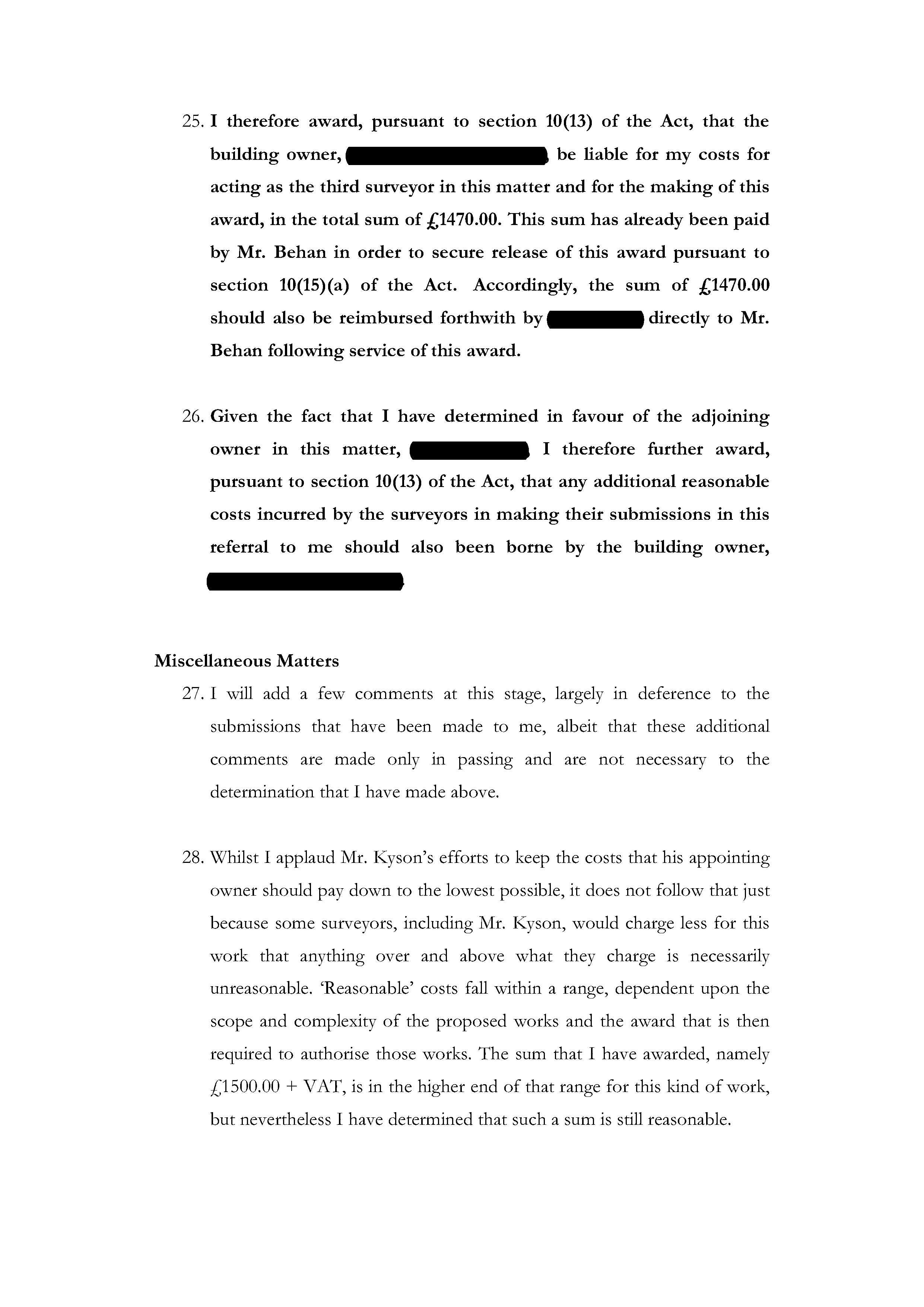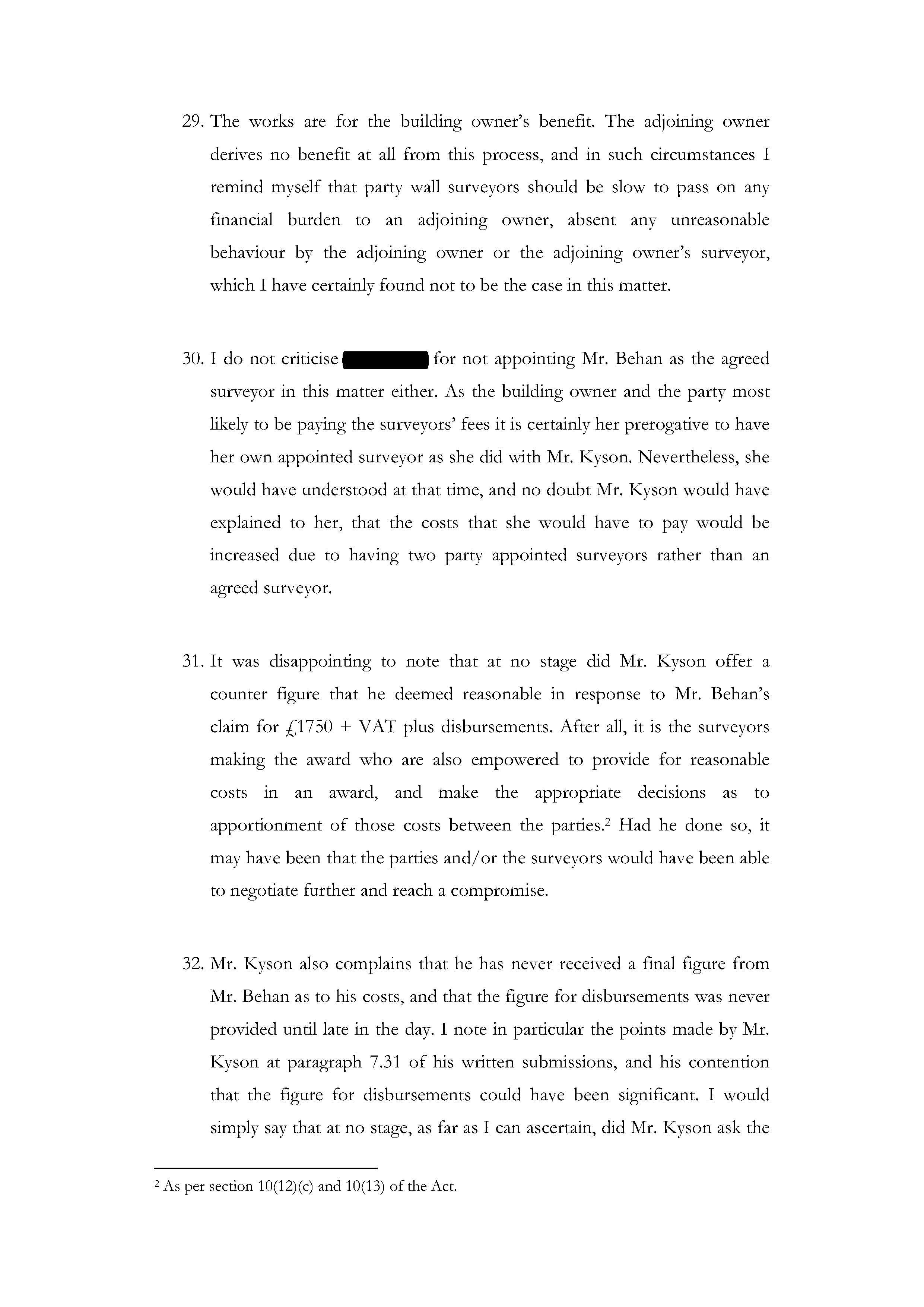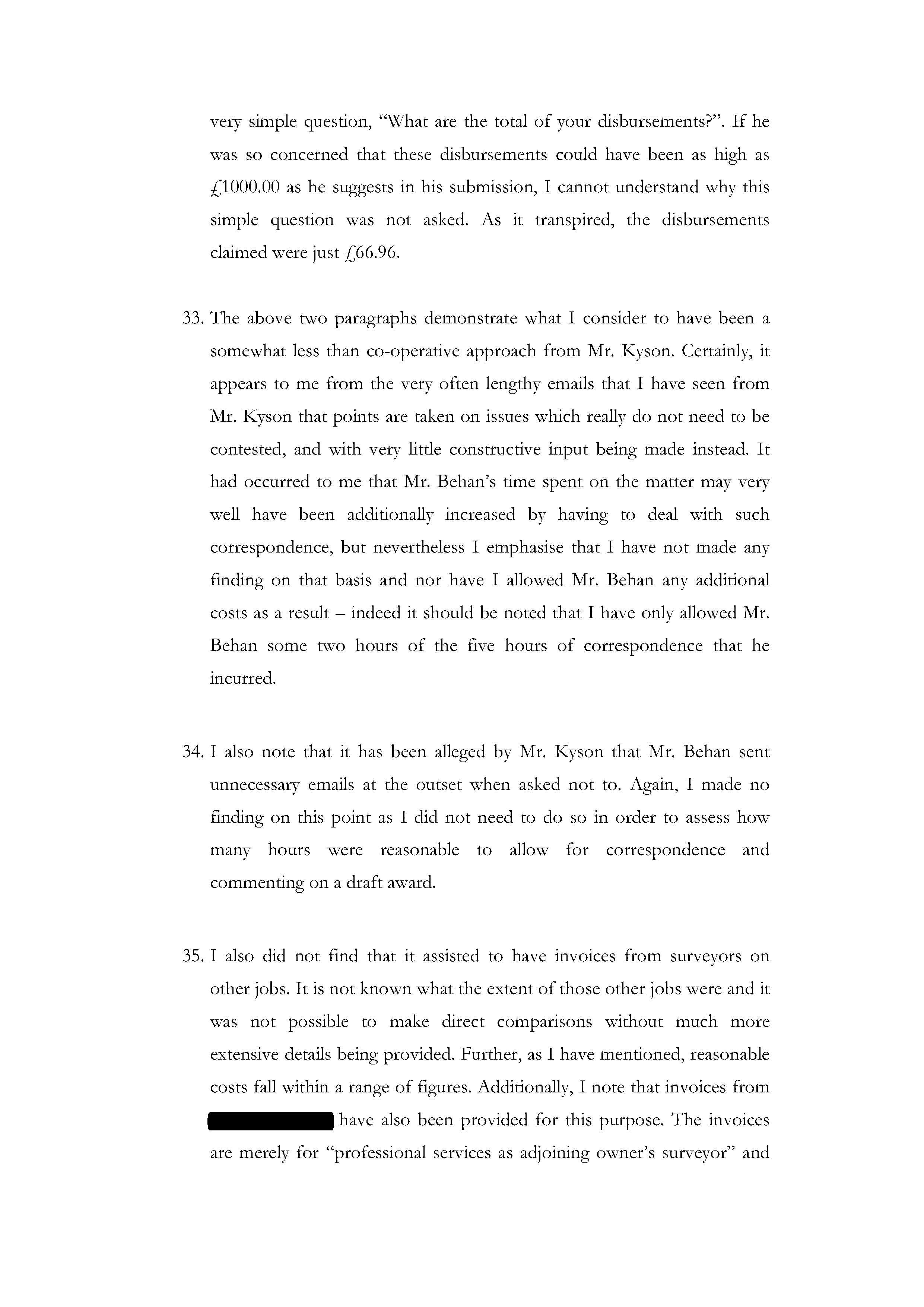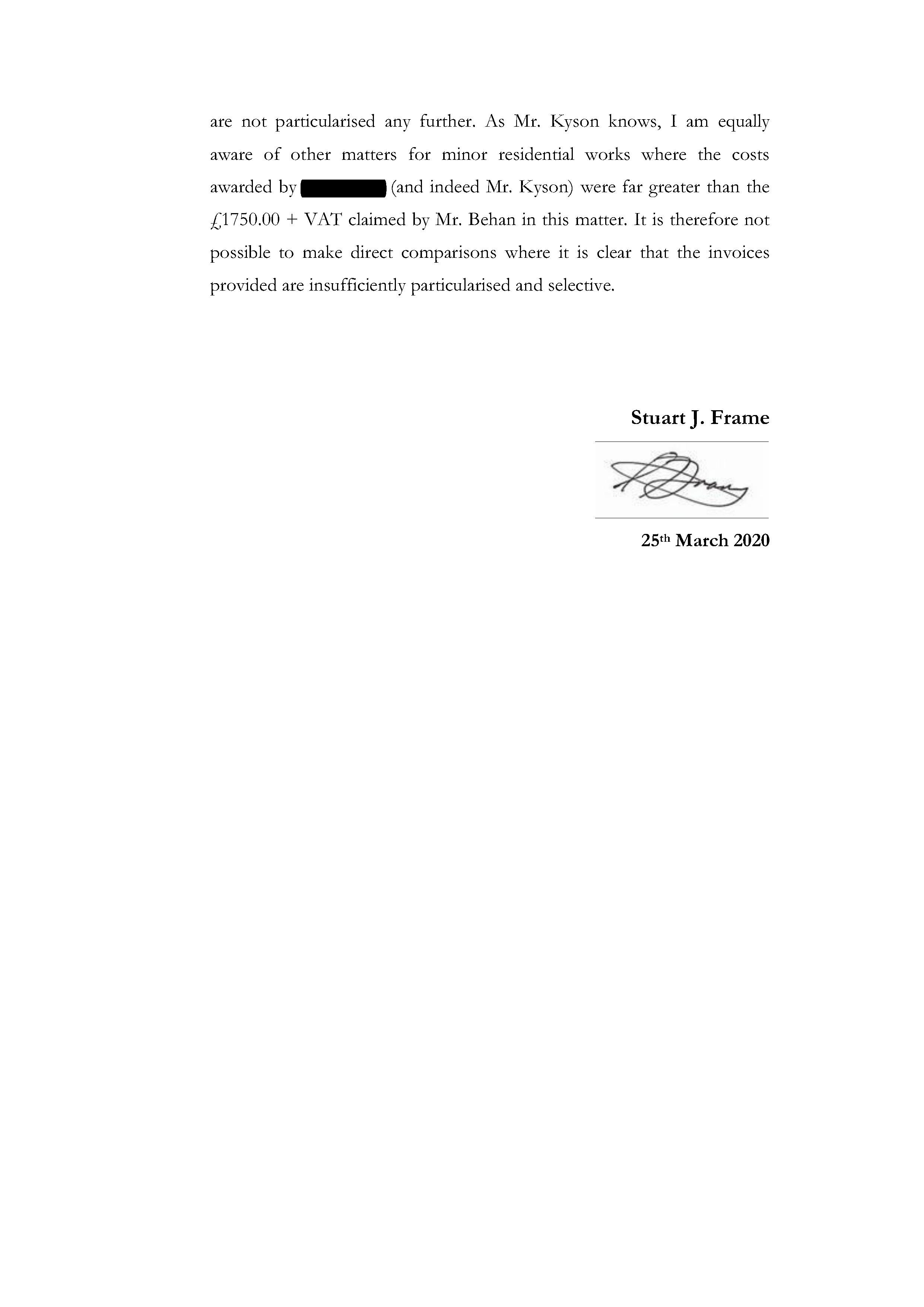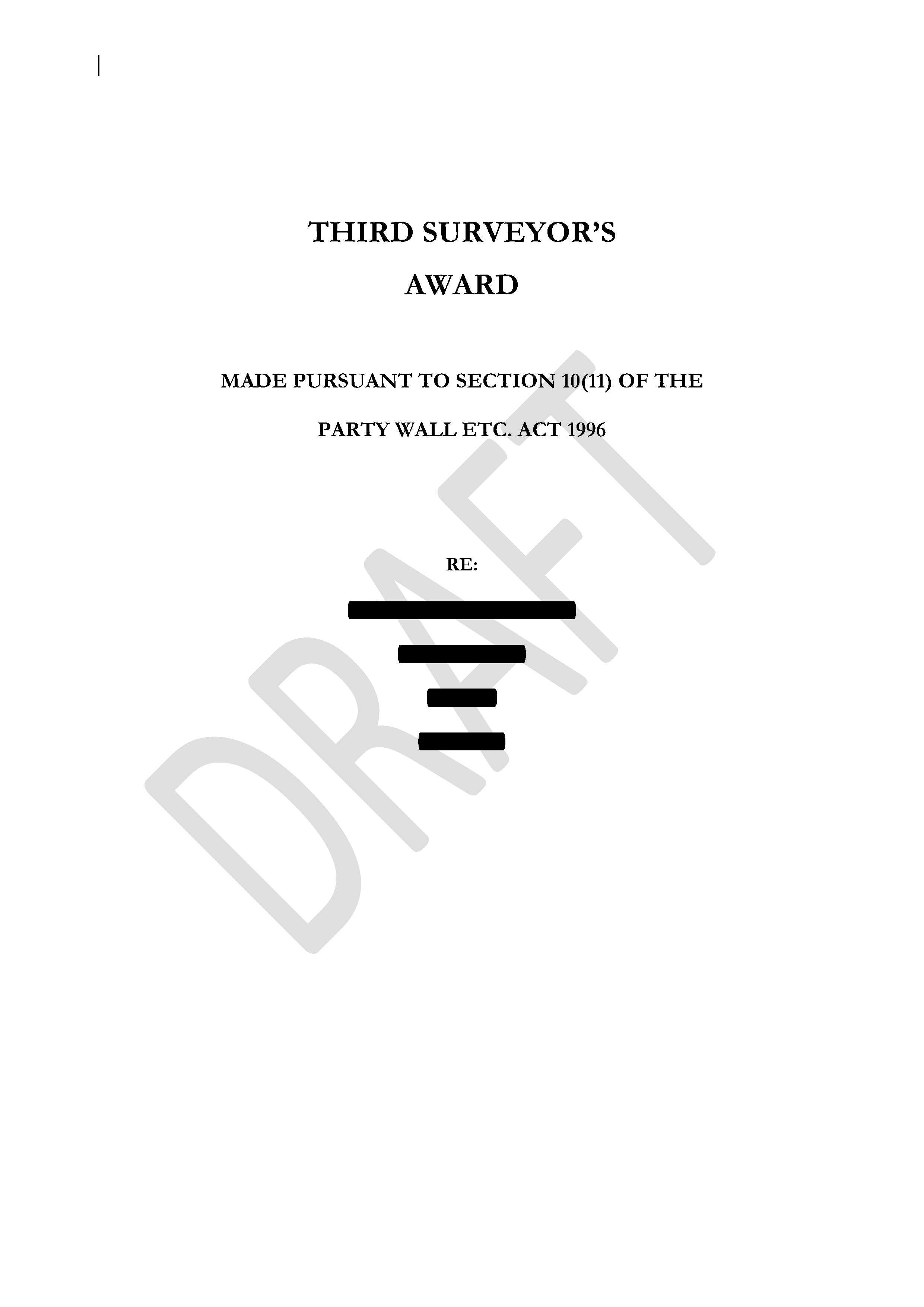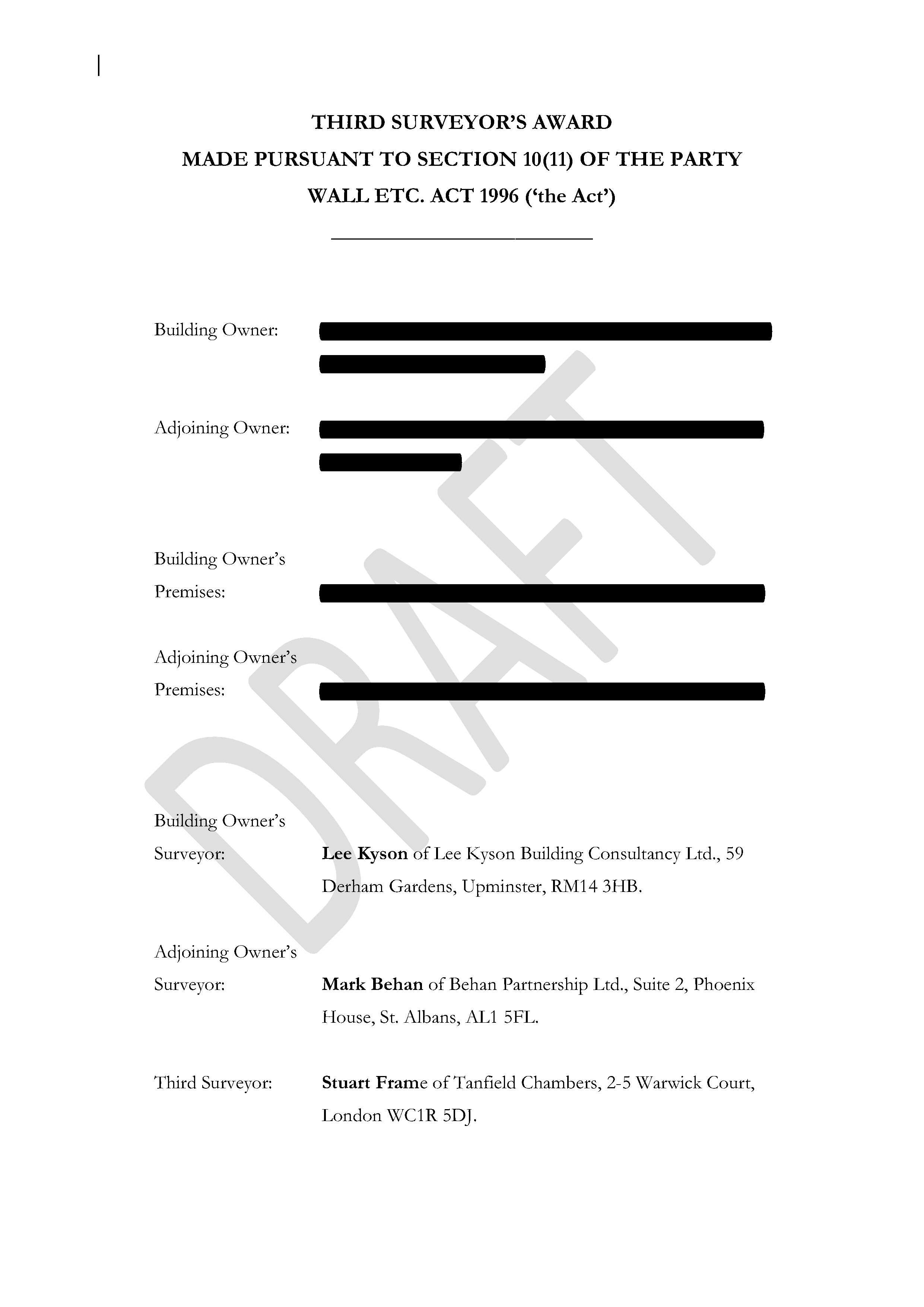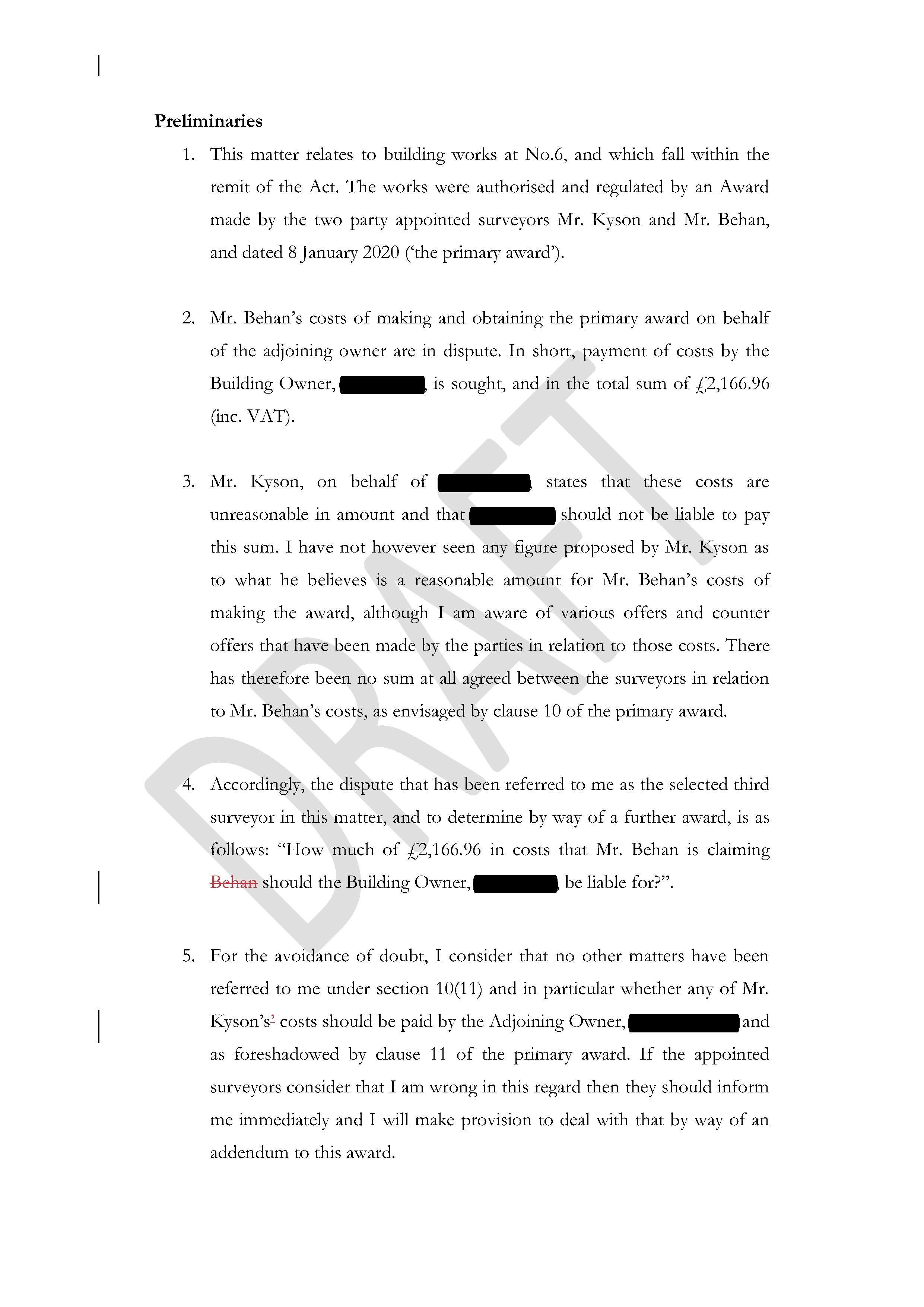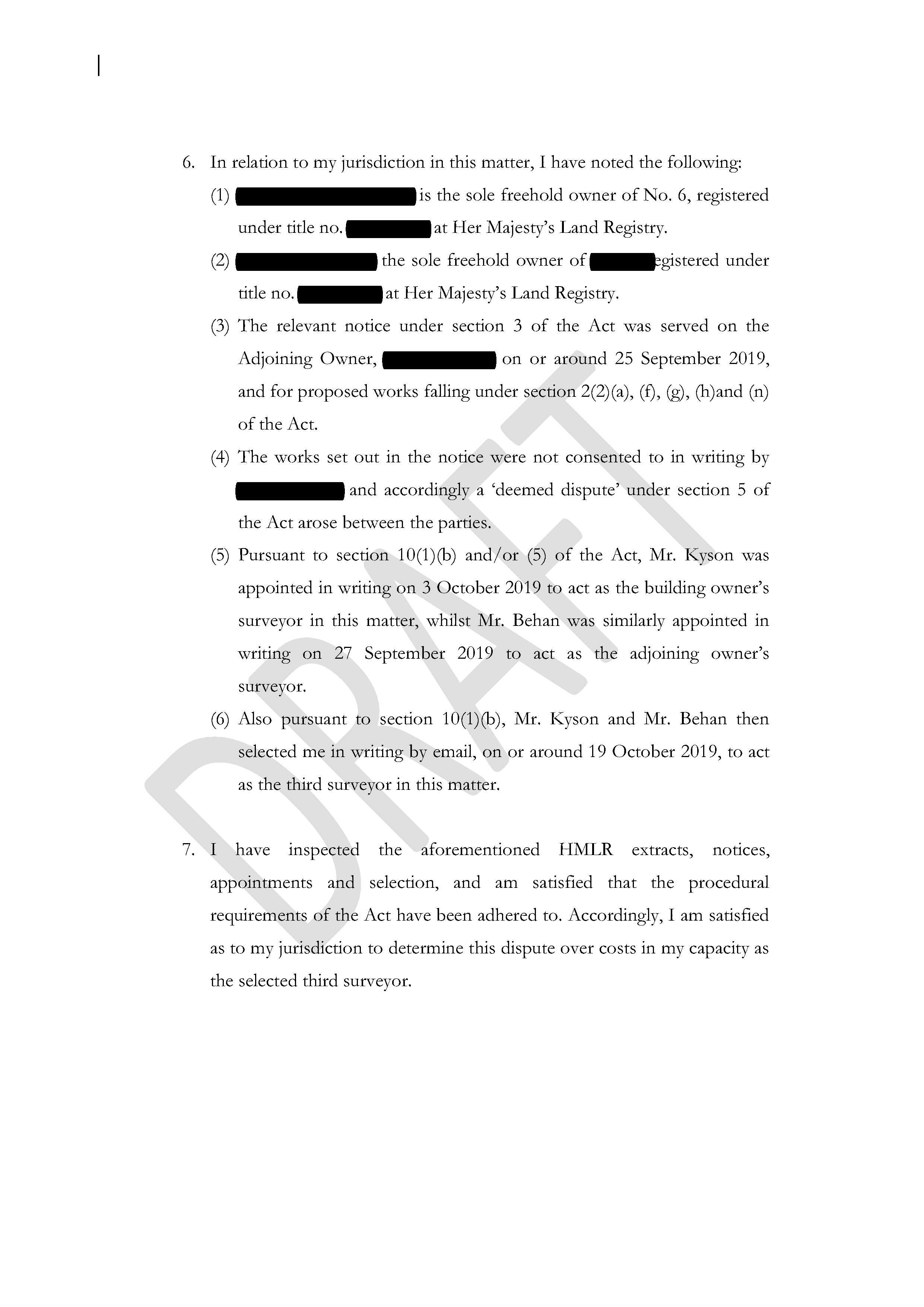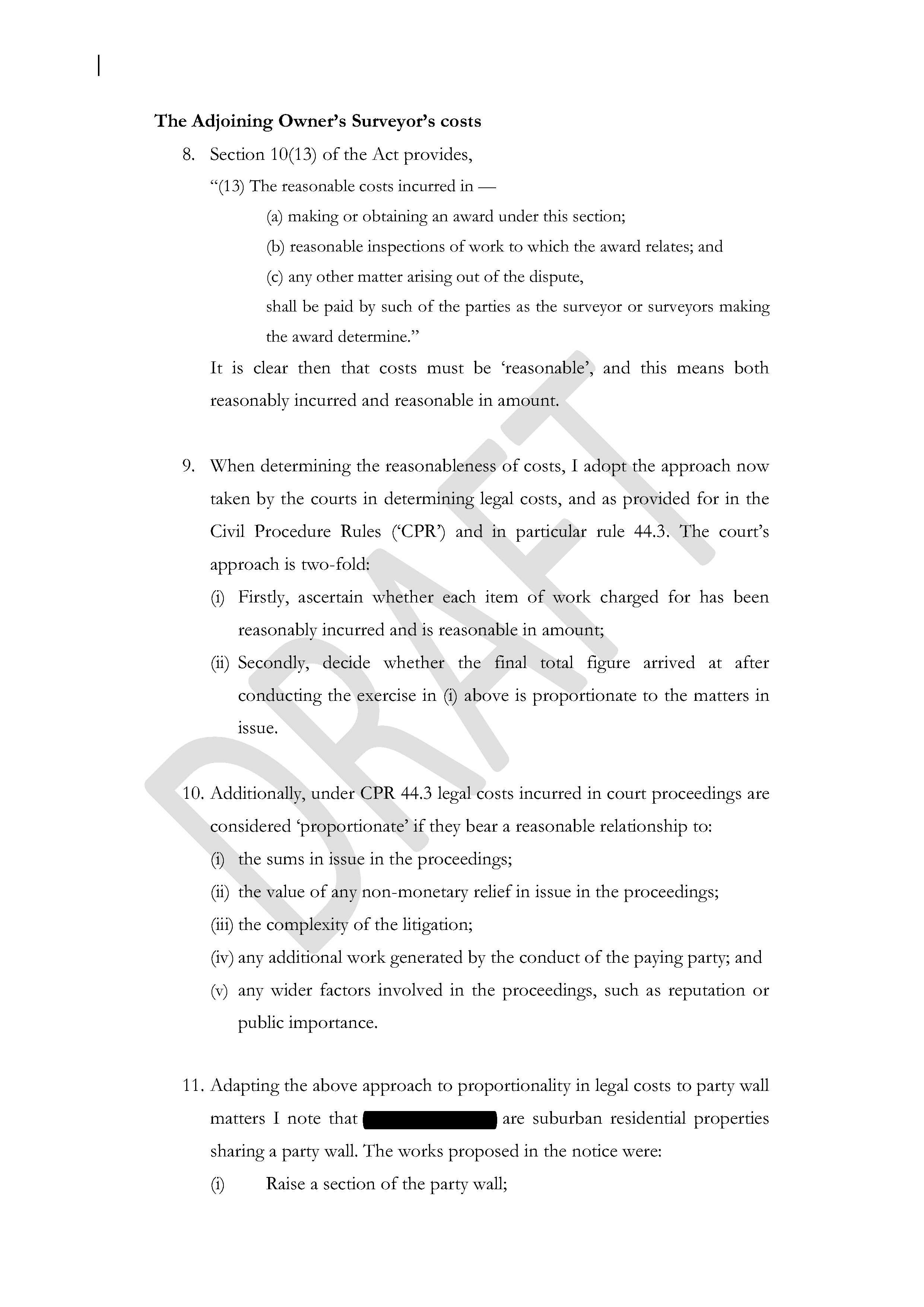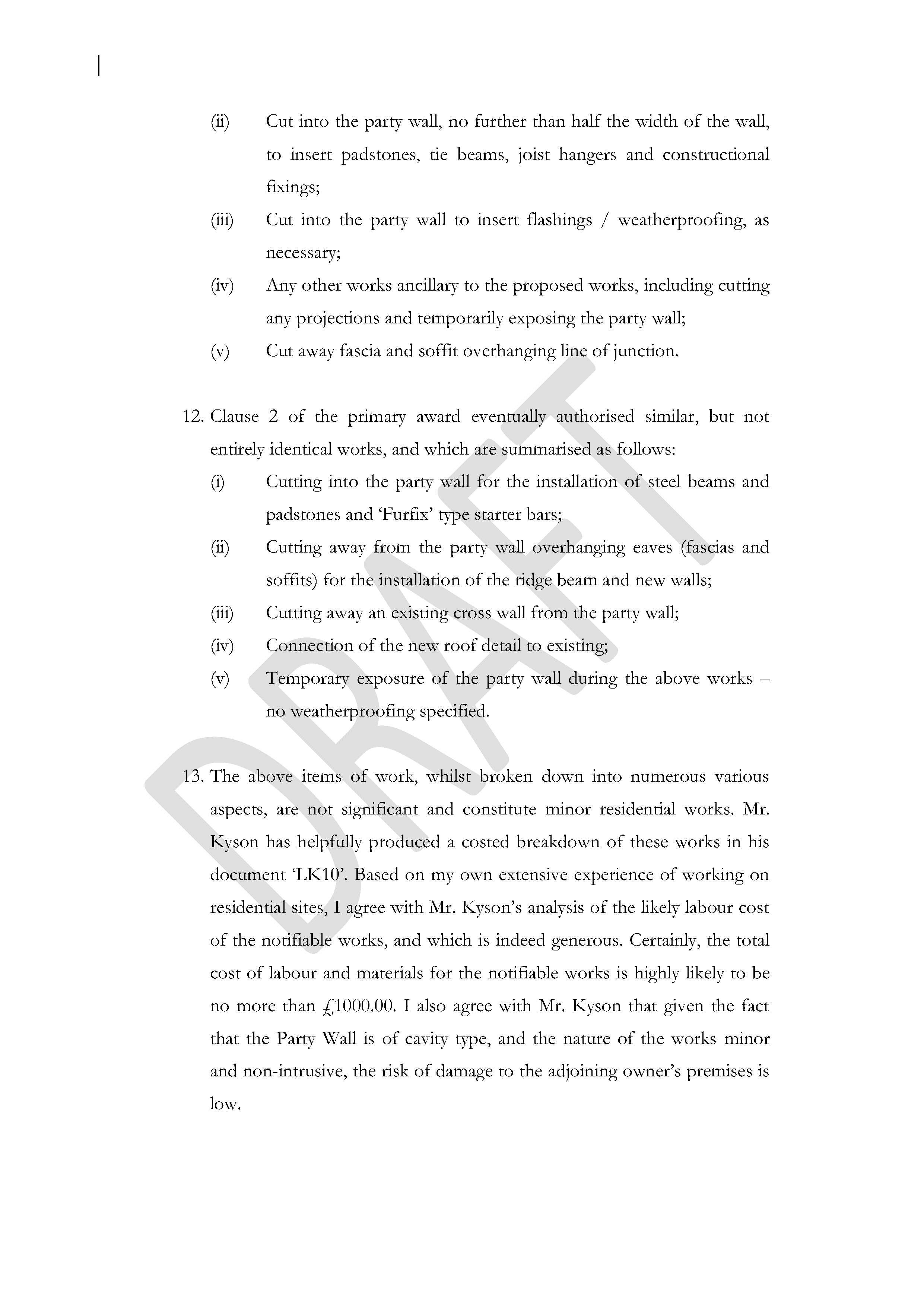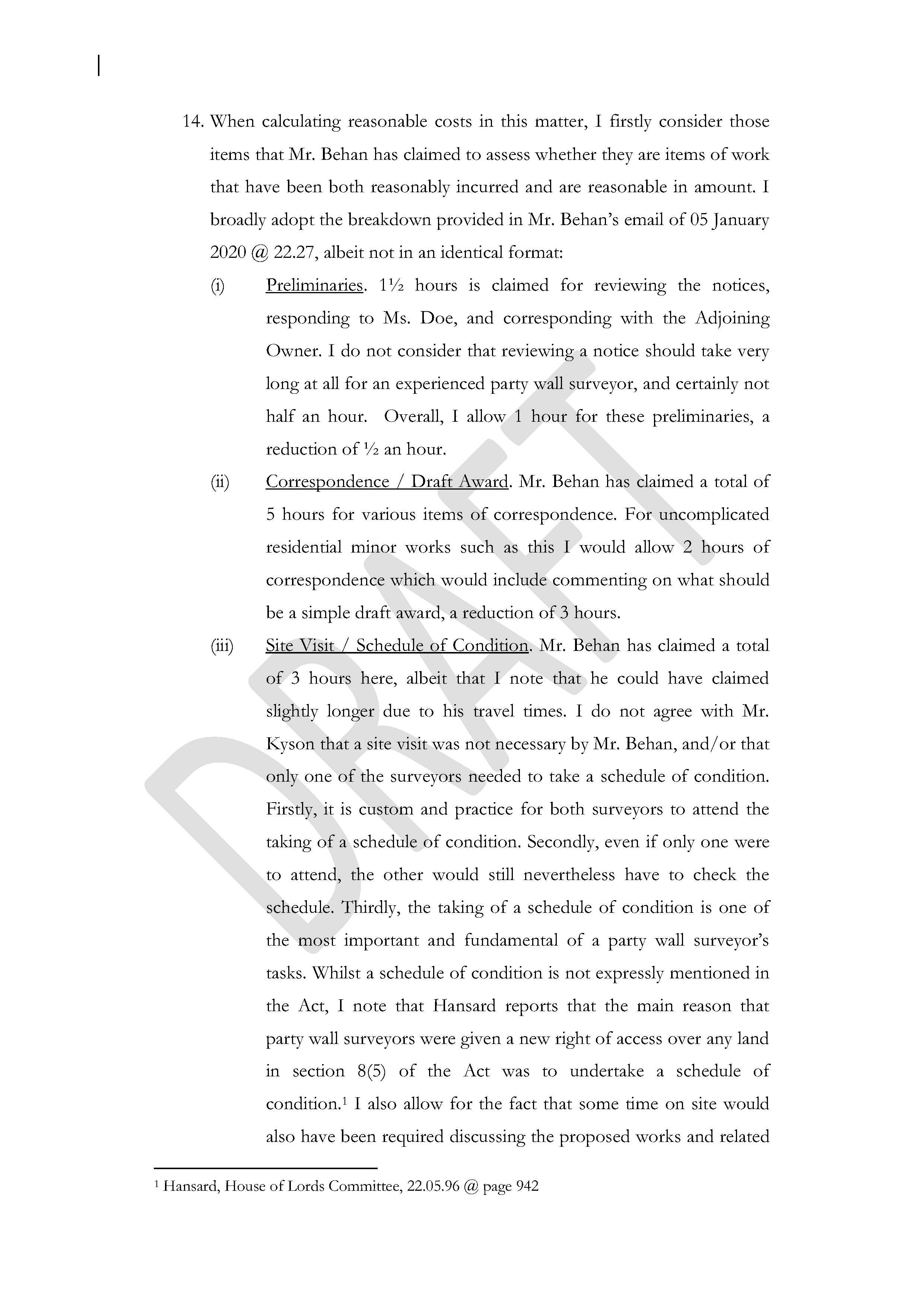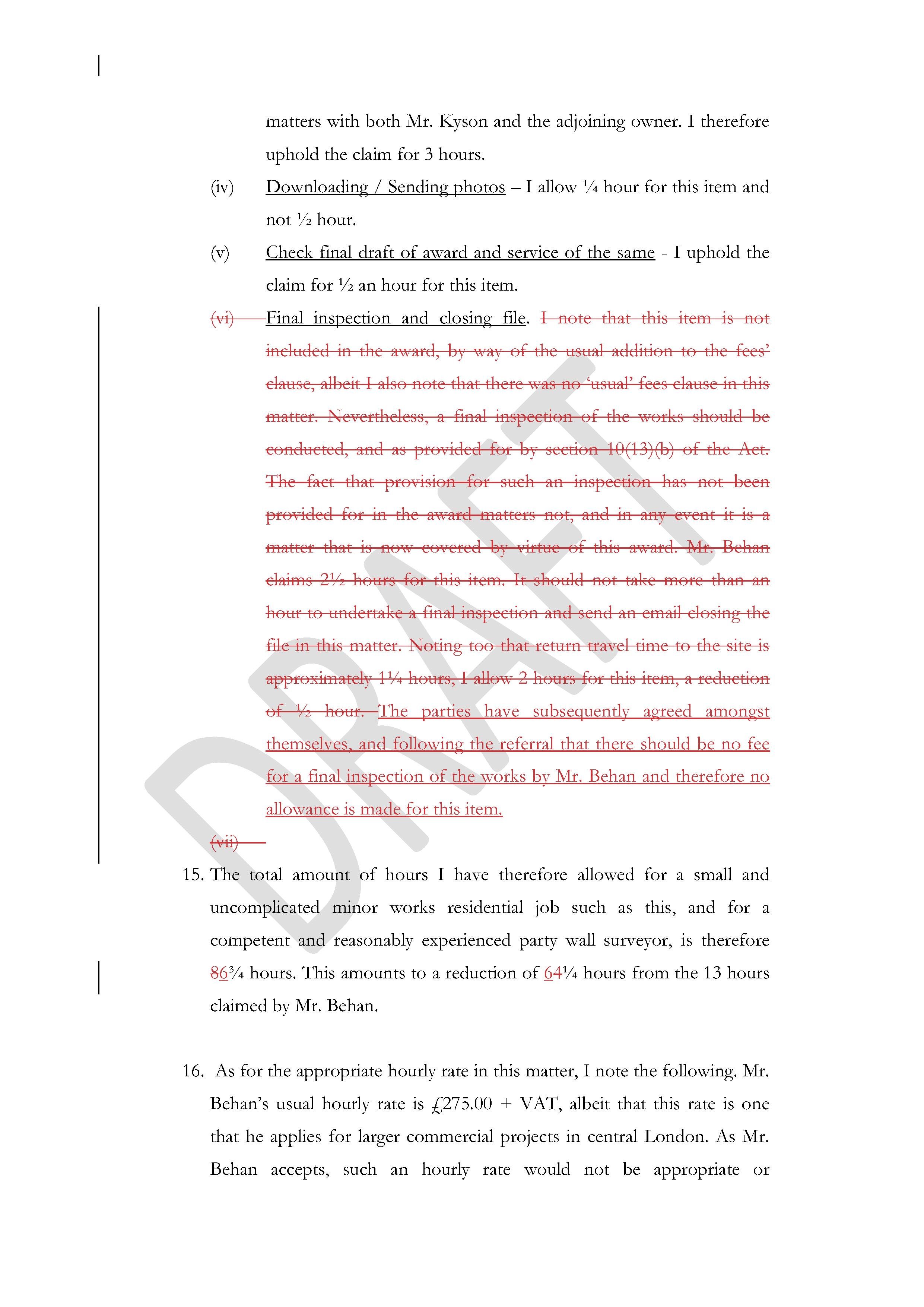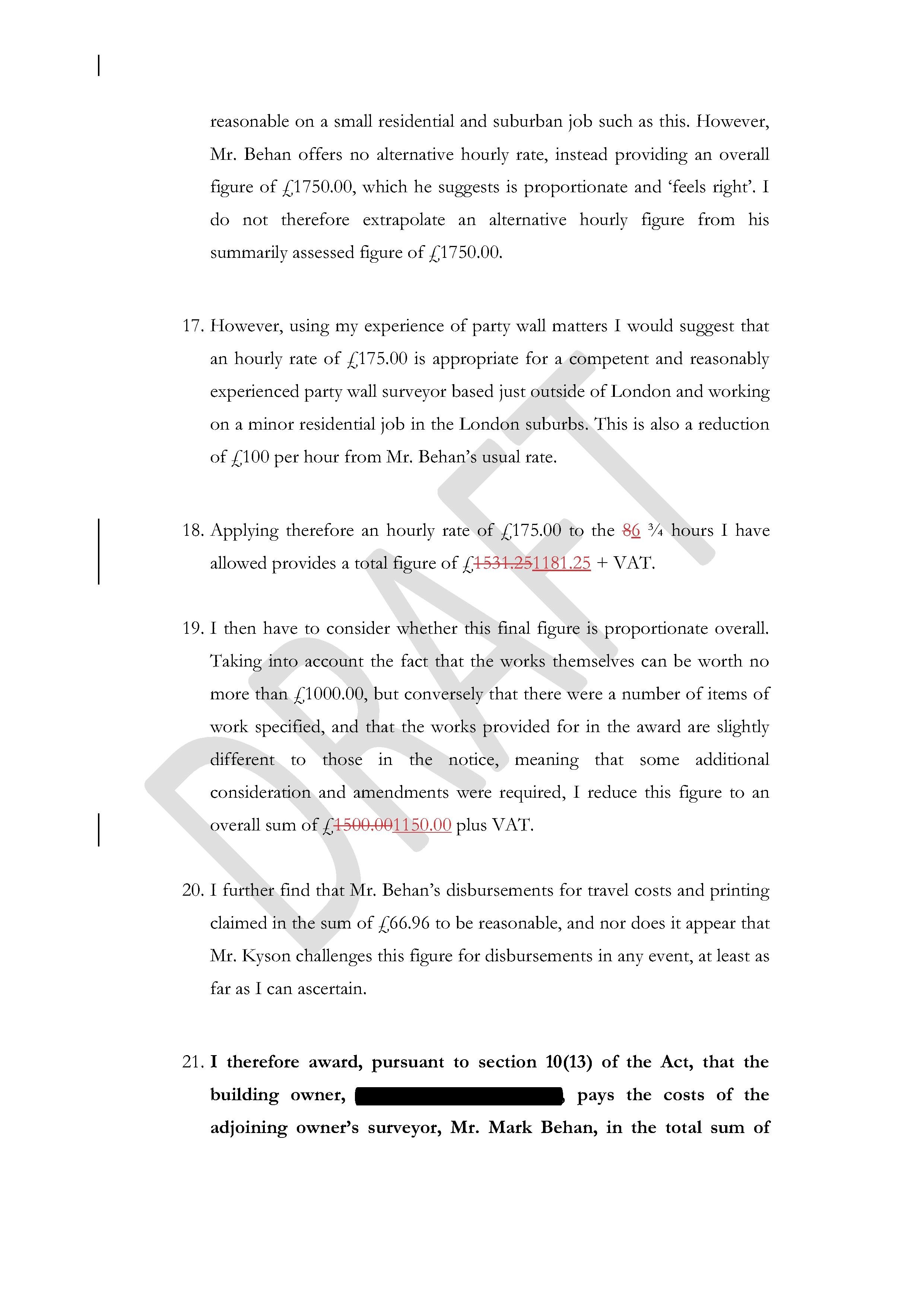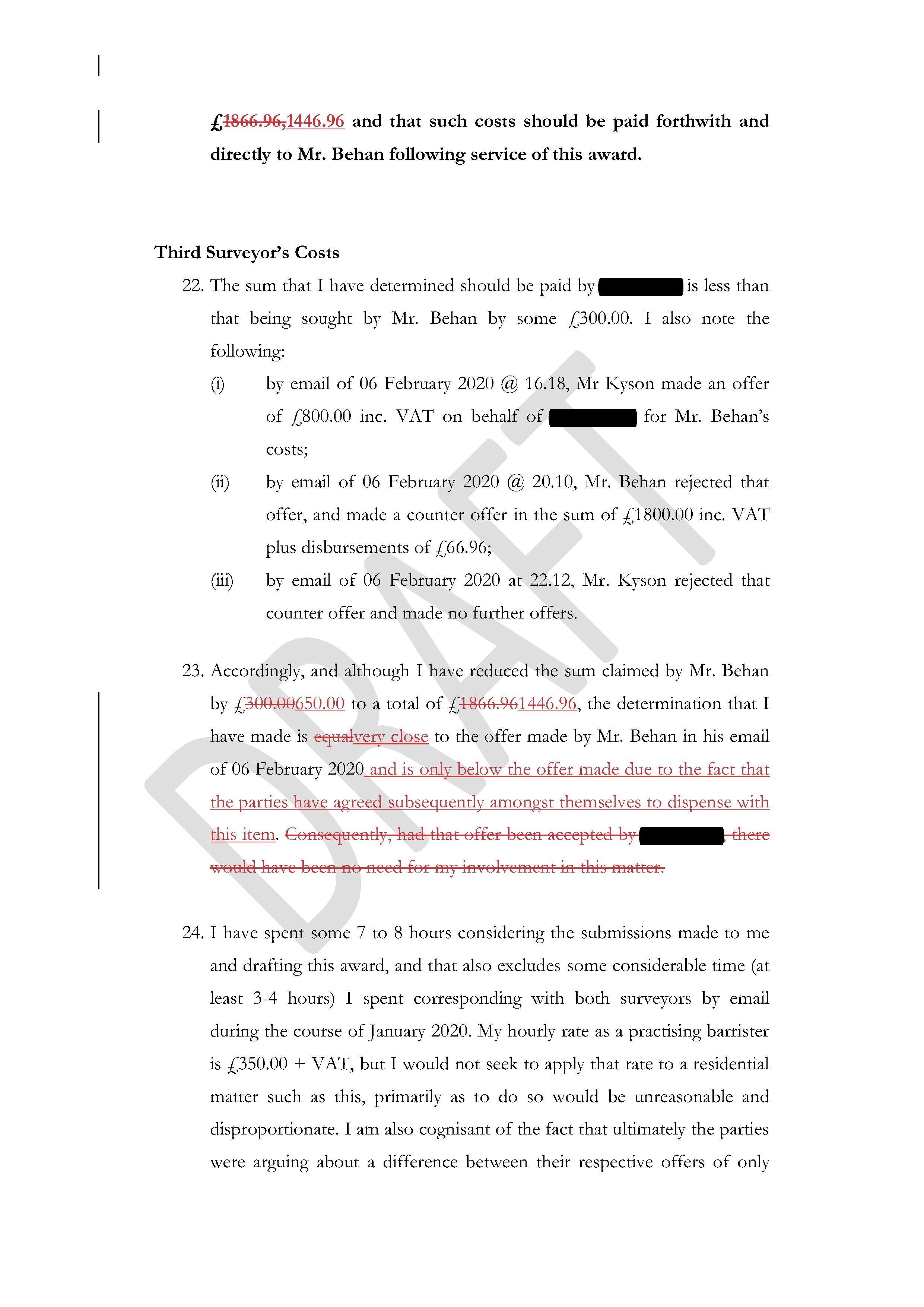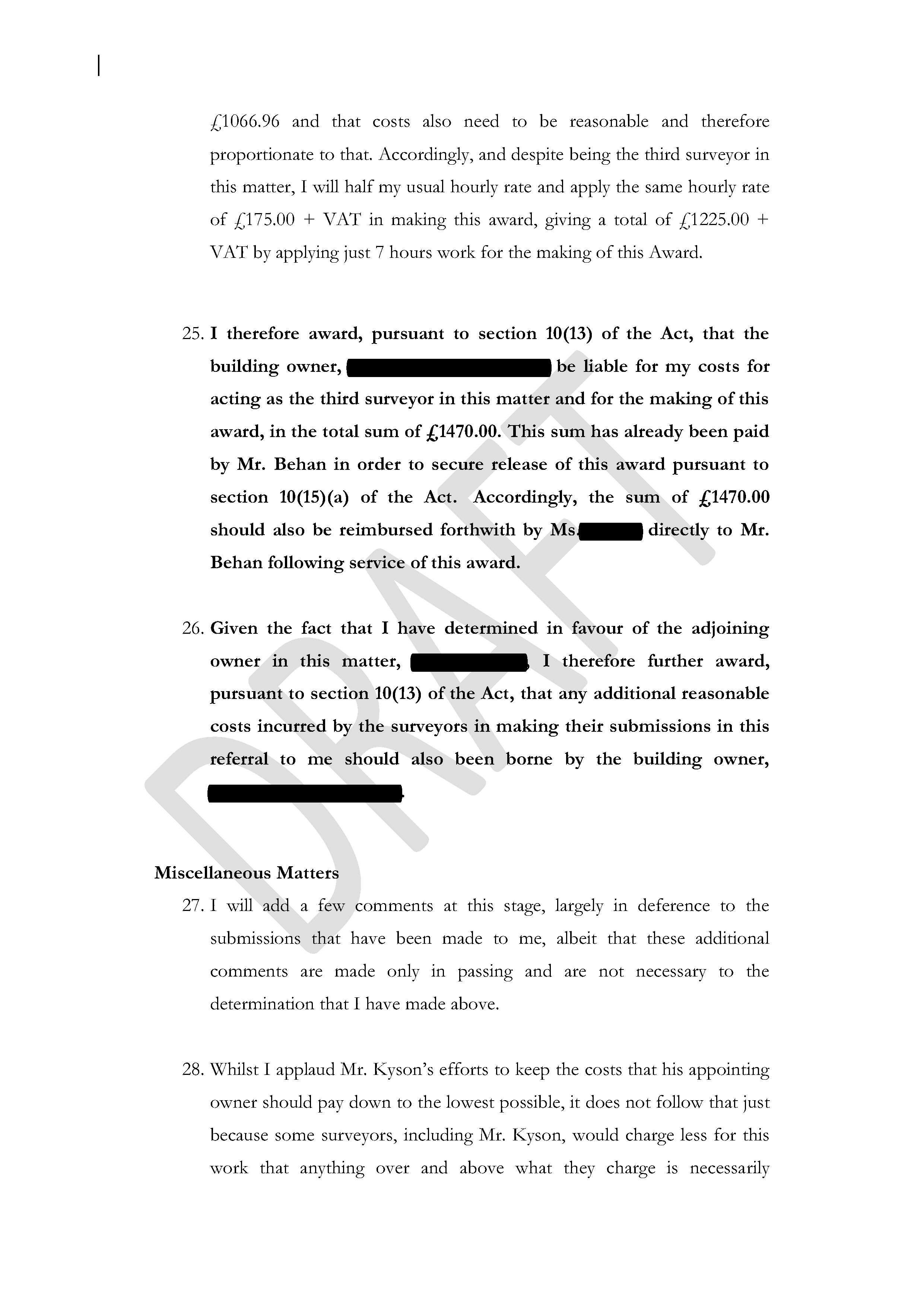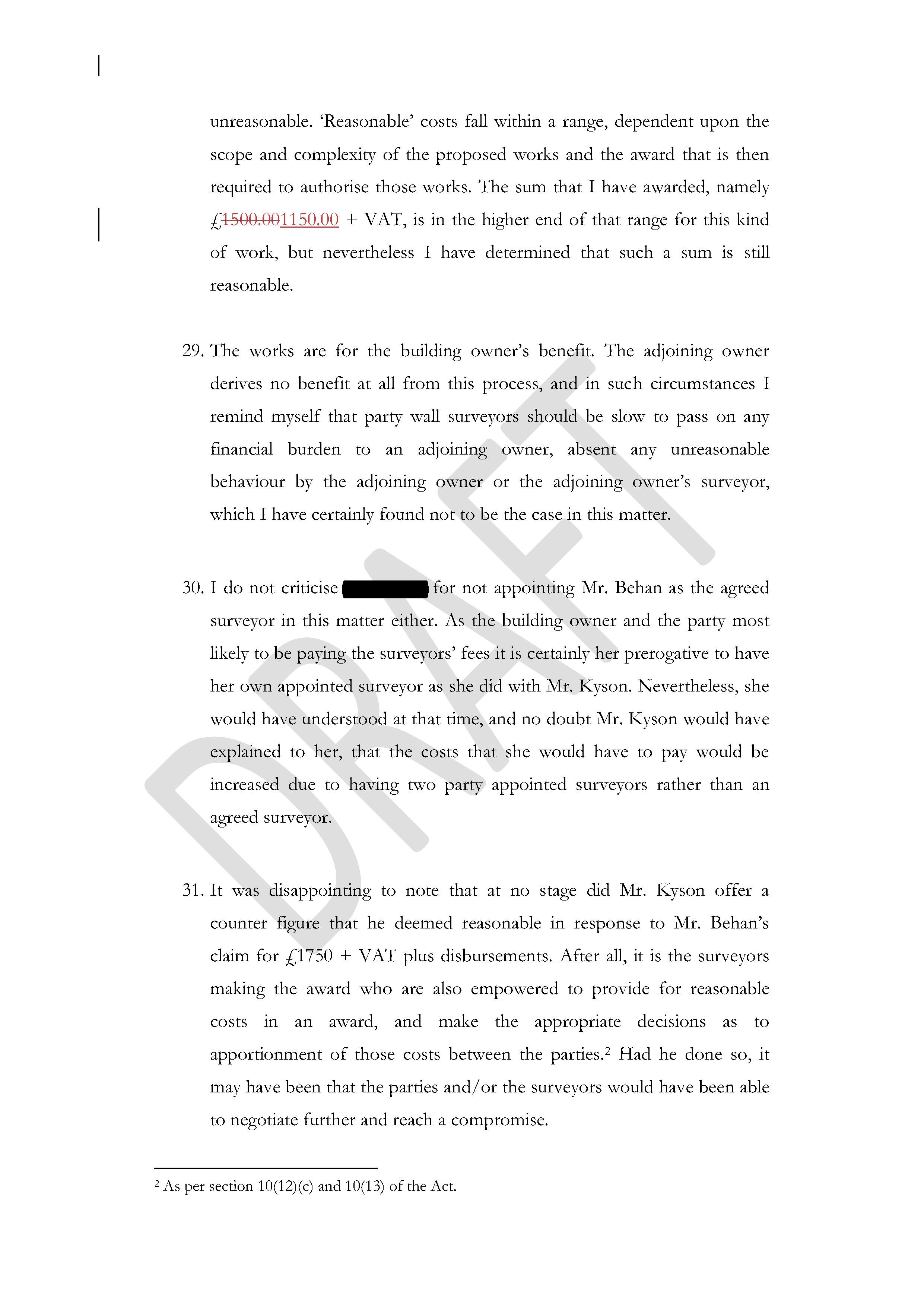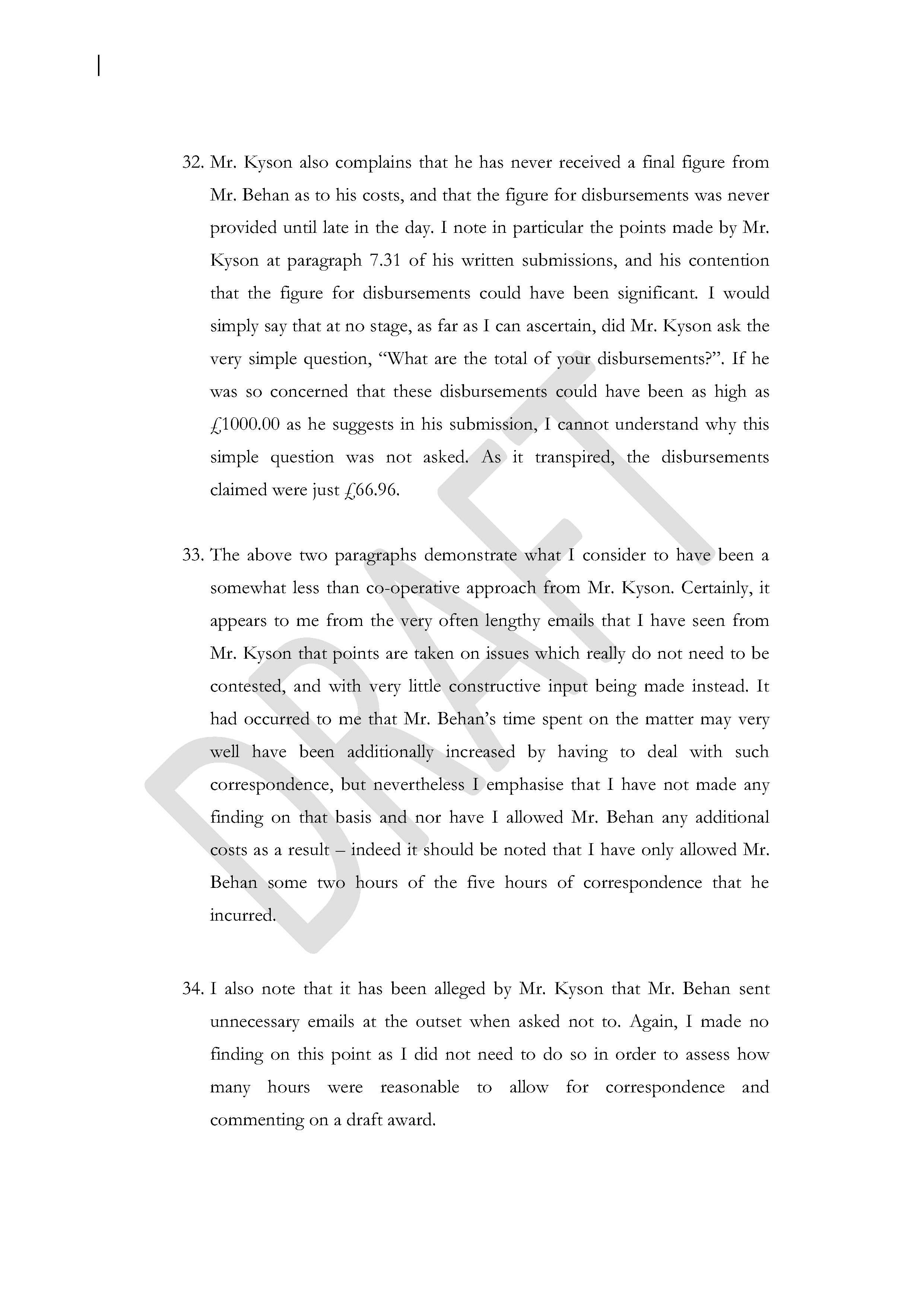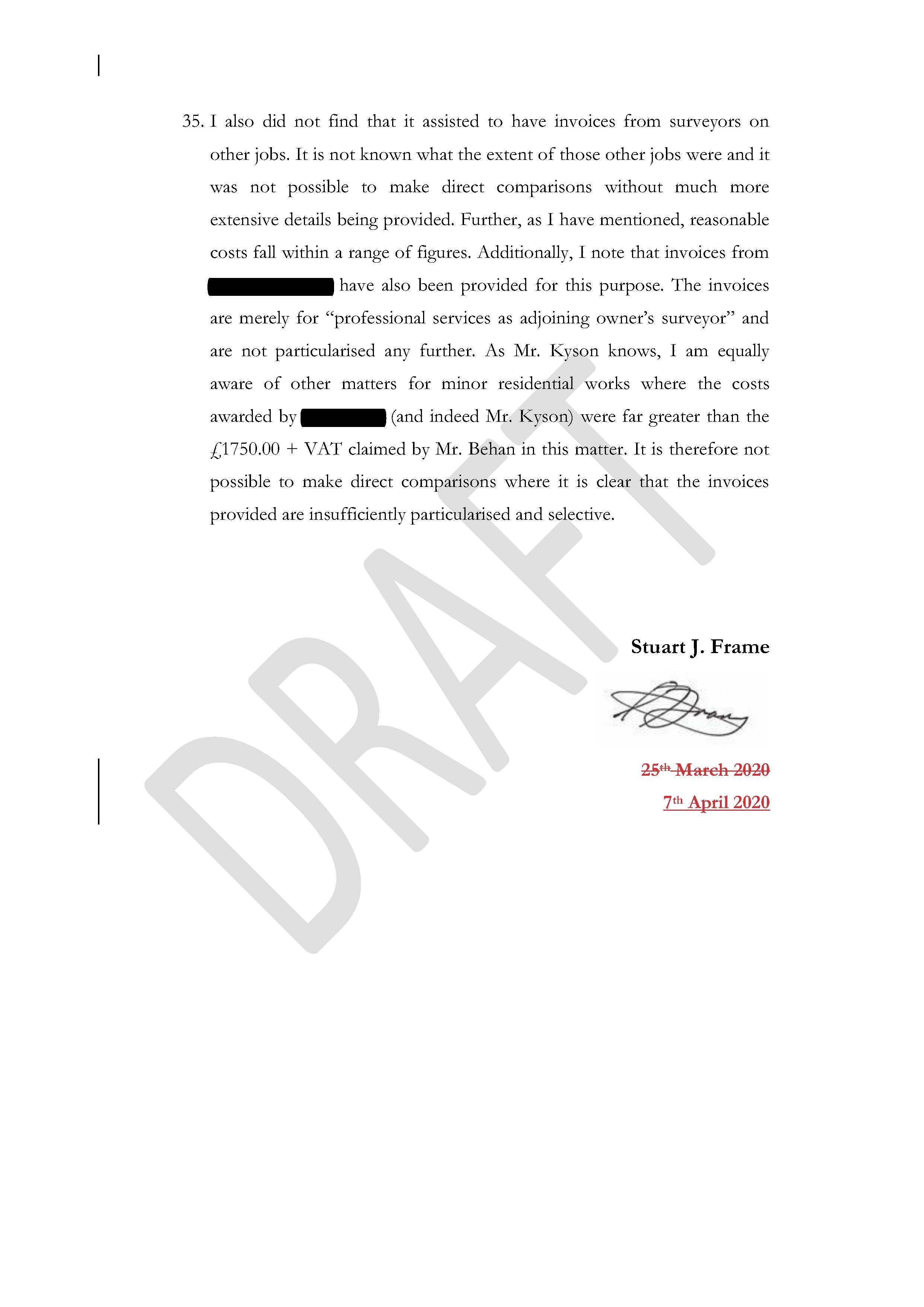Brief analysis of Stuart Frame’s third surveyor award(s).
This article is about an ‘award’ and a signed and dated ‘draft amended award’ made by Stuart Frame in his capacity as the selected third surveyor following a referral by the the adjoining owner’s surveyor Mark Behan. Mr Frame then went on to declare himself incapable. I have published the purported award because I believe there are several areas which conflict with Stuart Frame’s arguments and opinions put forward in other scenarios, in essence he argues both sides of the same coin and leads me to believe that you cannot rely on information provided by him. You can form your own opinion as to the award(s)… and Stuart Frame's (IMHO) paradoxical statements....
Stuart Frame made a third surveyor award in his capacity as third surveyor, under the Party Wall etc. Act 1996. I believe it to be erroneous, biased and to be of particular interest to the party wall surveying community because Mr Frame is a barrister specialising in party wall matters. I also recollect seeing him at seminars heavily criticising party wall surveyors over fees. I also believe his opinion’s over interpretation of the Act appear to be in state of flux. This will also be shown in an article about a legal opinion Stuart Frame made, got it wrong and then had to be paid again to produce another! I have also been made aware that he gets party wall surveyors enjoined as defendants in appeals of party wall awards see Dr Antino’s blog Capper, M (1) and Capper, R (2) v Macey, B (1) & Antino, P. (2) – (2021) The County Court at Central London H20CL135.
Stuart Frame was the selected third surveyor who was called upon by the adjoining owner’s surveyor Mark Behan. Stuart Frame made an award and then submitted a draft amended award. The building owner sought to appeal the award but fell foul of CPR see below. Personally, I believe the award is fundamentally flawed, hence why I have published it here; and in light of the recent case of Evans v Paterson 17 November 2021. I believe it could still be challenged on its validity, grounds will be added at a later date.
You can read and decide for yourself….
The properties were built a little over 20 yrs prior to carrying out the proposed notifiable works. The building owner had appointed a surveyor who served notices, the adjoining owner appointed Mark Behan. The building owner’s surveyor was unable to proceed, so I was subsequently appointed in her place. The works consisted of a 1st floor rear ‘infill’ between the two properties which involved raising a wall perpendicular against the party wall of which only the girth of the wall would be connected; removing a small wall from the party wall; connecting the new roof section to the existing verge overhanging the building owner’s land [arguably not a PW matter]; cutting out a couple of pockets in the external leaf of the party wall for some steel beams ~2.00m in length. The works were of a very simple nature and of little value, the chances of causing damage were extremely low and if damage were caused the remedial costs would be expected to also be very low. In essence a good quality photograph from the building owner’s back garden could have sufficed for a schedule of condition.
Stuart Frame is a junior barrister by profession specialising in party wall matters. He is also the head of professional standards for the Faculty of Party Wall Surveyors and carries the post nominals ‘HonFFPWS’ according to the FPWS website. https://fpws.org.uk/single-surveyor/?post_ids=2255 emphasis has been added by me.
MB’s referral is quite explicit.
Mr Kyson is being challenging and seemingly claims not to know of the dispute[1]. The dispute is as follows;
1. Mr Kyson still does not agree[2] any fees for me in acting as appointed surveyor for the Adjoining Owner.
2. I do not agree any fees should be paid to Mr Kyson by my appointing Adjoining Owner or myself.[3]
We would like you please to award our fees as we advised on 20 December, 31 December 2019 and several subsequent emails including 5 January 2020, several of these emails are attached for ease in the Appendix. The fee claim is £1750 plus VAT (£2100) and out of pocket costs £55.80 plus VAT (£66.96), total £2,166.96.
LK comments
[1] Confirmation that LK had raised concerns that a dispute had not crystallised, as MB had not submitted exactly what his fees were.
[2] LK was prepared to agree reasonable fees. No total fee had been submitted.
[3] The clause was agreed by MB see further below..
SF decided the disputed matter was ‘How much of £2,166.96 [incl. VAT] in costs that Mr. Behan is claiming Behan [sic] should the Building Owner, [redacted] be liable for?”
Stuart Frame made an award, however, IMHO
he decided inter alia matters that were not in dispute, in essence, he was amending the primary award which had not been appealed.
stating ‘I note that this item is not included in the award, by way of the usual addition to the fees’ clause, albeit I also note that there was no ‘usual’ fees clause in this matter. Nevertheless, a final inspection of the works should be conducted, and as provided for by section 10(13)(b) of the Act. The fact that provision for such an inspection has not been provided for in the award matters not, and in any event it is a matter that is now covered by virtue of this award. Mr. Behan claims 2.5 hours for this item. This statement is despite his article regarding payments for future inspections and had not been raised as a dispute by Mark Behan.... in his award Stuart Frame states '....and that such costs should be paid forthwith and directly to Mr. Behan following service of this award.' Payment in advance! Is Mr Frame going to announce that his FPWS article was / is wrong or his statement in his award?
In the Faculty of Party Wall Surveyors’ Autumn 2016 Newsletter SF authored an article in relation to final inspections
‘Turning firstly to that part of the costs clause in an award that states that the costs payable include one future inspection of the works. Clearly the reasonable costs incurred of reasonable inspections of the works are costs which are allowable under section 10(13)(b). However, are they awardable for future inspections?
Section 10(13) uses the word "incurred" (past tense), which is indicative of the relevant work having already been
completed. It does not use the phrase "to be incurred". This would suggest that the costs that can be awarded or otherwise determined by the surveyors are those which have already been ascertained, and for work already conducted. I would therefore query a surveyor's jurisdiction to include fees in an award for work that is yet to be done (namely the future inspection). Effectively surveyors are receiving payment for work that they have not yet conducted.
I do not see how such a provision in an award can be said within a surveyor's jurisdiction given the wording of the costs provisions in section 10(12)(c) and 10(13).’
LK comment: Paradoxical! no wonder he declared himself incapable.
‘IT MATTERS NOT! ‘ it matters a lot when it was not a matter in dispute and it was not referred as a dispute. The primary award was not appealed yet Mr Frame extends his jurisdiction beyond that of the courts!
Section 10(11). ‘…..to determine the disputed matters and he shall make the necessary award.’ A final inspection was not a disputed matter and MB did not request that provision be made in the primary award, neither was it raised as a disputed matter.
Awards made by Adjudicators have been subjected to the following criteria as laid down in:
Knox J. Nikko Hotels (UK) Ltd.v MEPC Plc [1991] 2 EGLR 103 at 108B, namely: "If he has answered the right question in the wrong way, his decision will be binding. If he has answered the wrong question, his decision will be a nullity".
A third surveyor is not so very different and I believe the same criteria would apply!
he subsequently made a signed and dated ‘draft addendum award’.
he then declared himself incapable ‘in accordance with 10(9)c.
‘This is to advise you all that in accordance with section 10(9)(c) of the 1996 Act I am deeming myself incapable of acting as the third surveyor in the above matter, and that I do so by virtue of this email to you all.’
this was after his purported award so could not have been ‘in accordance with section 10(9)c’. Is he saying that his award did not settle the dispute? as 10(9)c can only be invoked before the dispute is settled viz. (c) dies, or becomes or deems himself incapable of acting, before the dispute is settled,
Based on his own interpretation of the Act did Mr Frame have the authority to tell us all that he was incapable by email?
The building owner [BO] sough to appeal the award, my understanding is that she was taking the appeal documents to the court personally on the 14th day to ensure they were delivered and paid for within the 14 days. She was advised not to attend the court (by the court) because of Covid and to email the appeal documents but could not email payment. She emailed the documents and the court phoned the next day to take payment. The appeal was dismissed because payment was not made in time, despite the extenuating circumstances, an appeal to the High Court was dismissed on the failure to adhere to the CPR rules. It was a pity the payment was a day late, if it wasn’t perhaps Mr Frame would have been enjoined as a defendant. It was his lucky day.
The building owner has given me permission to publish the awards etc., Mr Frame has already objected to them being published…. I am not surprised!
You will of course note, what I believe to be, some anomalies within the purported award such as ‘If the appointed surveyors consider that I am wrong in this regard then they should inform me immediately and I will make provision to deal with that by way of an addendum to this award.’ personally, I do not believe that surveyors can amend the award by way of an addendum award, after all, once served, it is the property of the owners not the surveyors.
Due to the work being of such a simple nature LK had proposed that only one surveyor was required to carry out the schedule of condition, Stuart Frame in his purported award agrees the works and labour would be less than £1,000.
I believe we are both more than capable of carrying out a schedule of condition and given the nature and actual extent of the notifiable works I would suggest that there is no need for both us to attend, therefore, I wish to carry out the SoC as I more local and very likely to be more cost effective. I trust you concur in this approach.
If you wish to carry out the SoC please submit a fee quote and should it be higher than mine then I feel the adjoining owner should pay the excess as the BO is only responsible for reasonable fees. Irrespective of whoever does the SoC it does not remove the other surveyor in the event of any damage being caused. However, I am concerned that you feel that you need to see the property first hand to understand the works
but MB refused stating :
Clause 2 lists a good number of works with references to works affecting the AO property and whilst we do need a schedule of condition to be agreed which I wish to agree in person, I also need to understand first hand the items you list as awarded notifiable work and how these will affect the AO in the temporary and permanent condition.
If the BOS carries out the SoC then the AOS is at liberty to check it off when the works are completed with any issues arising through lack of due diligence by the BOS would be to the detriment of the BO/BOS not the AO.
SF goes to great pains to try and justify the necessity for two surveyors to carry out a schedule of condition, which totally conflicts with his article in the FPWS Newsletter as do his representations in several court cases regarding this matter. The FPWS article and SF’s purported award were both in the Spring of 2020!
SF fails to acknowledge that Hansard also makes reference to an agreed surveyor being appointed for domestic notifiable works, whereby only one surveyor is required to carry out a SoC.
In the Faculty of Party Wall Surveyors’ Spring 2020 Newsletter TS authored an article ‘ Schedules of Condition – How Important Are They?’ in which he states inter alia ‘ The taking of a schedule of condition is not, therefore, something that needs to be done for the surveyor to fulfil that duty. Additionally, as we have often been reminded, there is no mention whatsoever of a ‘schedule of condition’ in the Act itself.’ He then iterates ‘In Barberini v Weihe, when considering the quasi-judicial functions of a party wall surveyor, HHJ Bailey referred to the taking of a schedule of condition as one of the administrative functions of a party wall surveyor that can in fact be delegated to another, and one does not need to be conducted by the appointed surveyor themselves’.
Porter v Morgan IN THE COUNTY COURT AT BIRMINGHAM (TCC LIST) Appeal No BM50160A Claim No A20BM075 at para 56 of the judgement HHJ David Grant (ret) states:
In paragraph 21 of his skeleton argument Mr Frame submitted:
“… There is no express requirement within the Act for surveyors to take a schedule of condition, or that it should form part of an award. Nevertheless it is a wise precaution in the event the damage is caused by the works to the adjoining owner’s property.”
LK did not object to the AOS carrying out the SoC, he simply stated that either one of them could do it and that it did not require both surveyors.
The two fee clauses in the primary award agreed by LK & MB were:
10. THAT the Building Owner shall pay the Adjoining Owner's costs by way of her Surveyor's costs in the sum of ‘an amount to be agreed between the two surveyors’ and in the event of them not being able to agree the difference may be referred to the third surveyor.
11. THAT the Adjoining Owner shall pay the Building Owner's Surveyor's fees for dealing with unnecessary matters emanating from the Adjoining Owner’s surveyor in the sum of ‘an amount to be agreed between the two surveyors’ and in the event of them not being able to agree the difference may be referred to the third surveyor.
I do not recollect any discussions taking place after the primary award was served, albeit I will check this; MB had been offered £800 nett. However, it is quite clear that MB had agreed the clause and the difference in both instances ‘the difference may be referred to the third surveyor’. Both clauses make reference to the ‘difference’ only. The difference being £1750 - £800 = £950 which is what MB should have referred. As can be seen in the ‘draft Amended Award’ MB was awarded £650 less than the £950 but SF still awarded costs against the BO. The fees put forward by MB lastly but not as a referral, were:
Mr Frame, I have made a fair allowance of £1750 plus travel to and from site for the schedule and then as a final inspection.
plus travel 2 hrs?, final inspection 2 hrs? [final inspection was not raised as a disputed matte] does not equate to £2166 which included VAT the other figures were nett! SF makes reference to MB being offered £800 incl. VAT but this was not true it was £800 + VAT.
SF has noted §15’… This amounts to a reduction of 4 ¼ hours from the 13 hours claimed by Mr. Behan.’
SF awarded MB 8.75 hrs from the 13 hrs claimed.
Taking into account the reduction by removal of the ‘final visit’ this should be reduced by a further 2 hours. This provides that MB should have been awarded 6.75 hours at most, notwithstanding the issues of two surveyors being required for a SoC.
On the basis of 6.75 hrs being the maximum which should have been awarded, which is 52% of what he claimed, and given that 52% equates to £908.63, the costs of the TS Award should have been apportioned to the adjoining owner as this sum is only £108.63 more than the offer made to MB but £841.34 less than he was claiming.
I do not understand why SF awarded MB £175.00 per hour, when the referral made reference to £1750.00 for 13hrs i.e. £134.61 per hr.
SF reduced the time spent by 33% but only reduced the fee claim by 14% in his 1st award???
SF then sent an email to all involved… ‘This is to advise you all that in accordance with section 10(9)(c) of the 1996 Act I am deeming myself incapable of acting as the third surveyor in the above matter, and that I do so by virtue of this email to you all.’ Can a surveyor deem himself incapable ‘in accordance with 10(9)c’ ?
Despite raising the issues of surveyors’ fees at FPWS seminars, we now know that Mr Frame accepts that £1500 + VAT + disbursements is acceptable for the smallest of works bearing in mind that the notifiable works would cost less than £1,000, there was very little risk of damage being caused and that as a party wall surveyor you can charge on the high side. Most surveyors I know take the view that a more experienced surveyor charging a higher hourly rate would complete the task quicker and more efficiently than a surveyor charging a lower hourly rate. It would appear that Mr Frame differs in this approach and would prefer to support surveyors charging in the higher bracket.
He makes reference to fees awarded in a party wall matter that I was involved in but deliberately fails to mention that this was a matter which involved a 10(4) appointment, damage to the AO’s property, an intransigent BO and having to converse with the BO’s solicitors - there is no comparison as SF well knows, he represented 3 of the 4 defendants (I was LiP) in the case Yamin v Edwards(2), Power & Kyson.
SF served his purported award by email not by post:
‘I am therefore formally serving the award by email on you both, and pursuant to section 15(1A) of the 1996 Act, to the email addresses that you have each provided for this purposes. I have also cc’d Mr. Kyson and Mr. Behan into this email for completeness.’
did stuart frame have authority to serve his purported award by email?
A separate matter in 2020.... On his own submission when writing* [see bottom of page] to the defendant on behalf of Justin Burns (Burns -Redler Award) he claimed that I did not have authority to serve a request (s10(7) ) by email on Justin Burns - despite all correspondence being carried out by email and JB thanking me for the email / request in question, thereby confirming receipt! therefore, on Mr Frame's interpretation the Letter of Appointment to accept documents and requests by email does not extend to anyone other than the person named in the LoA. My LoA was specific to me, as was MB’s LoA specific to him, nobody else was authorised to act on the content of the surveyors’ LoAs. Stuart Frame’s name was definitely not on either! and I do not recollect Stuart Frame having permission from the building owner to serve his award by email on her either, neither did I provide him with permission. Stuart Frame relies heavily upon the amendment to the Act but IMHO has cherry picked what he wishes to apply, the amendment makes clear ' (1B) A statement under subsection (1A) may be withdrawn by giving a notice to the person to whom the statement was made.' If it can only be withdrawn from the person to whom the statement was made then it must surely mean that the statement only applies to the person to whom it was given and nobody else. The LoA was passed onto Stuart Frame by Mark Behan, not by me or the BO. This is the only conclusion I can come to based on Stuart Frame’s own interpretation. In essence the award was not validly served, in the same way that SF states the request was not validly served on Justin Burns.
When confronted with the issue, as I believe he ‘cherry picked’ from the Act and had not fully understood the amendment, deliberately chose not to, or to provide a response with substantive reasoning Stuart Frame responded….
The third surveyor I made [sic] was served correctly on both owners by email, with you and Mr. Behan merely cc’d in.
Both owners had authorised such service to their respective email addresses. Your owner in her letter of appointment dated 03.10.19 and Ms. XXXXXXX in an email to me on 17.02.20.
Your assertions are therefore wholly wrong.
I believe that your email below confirms yet again that you are harassing me. I have warned you previously and this is my final warning to you – if I receive any more emails from you seeking to intimidate, harass, and/or vexatiously trouble me with historic matters or matters generally then I will take this matter further, both with the police and via the civil courts. This is my final warning to you.
I will now be blocking your emails to this email address as well as my Tanfield Chambers email address, from which you are more than aware you have already been blocked.
On the plain reading of the amendment...
(c) the notice or document was transmitted to an electronic address specified by the recipient. (1B) A statement under subsection (1A) may be withdrawn by giving a notice to the person to whom the statement was made.
I believe that in providing an email address in a letter of appointment would only give the named recipient authority to use the email address provided and that the authority would not extend to others. It would be an absurdity if the statement can only be withdrawn from the person to whom the notice was made but still extends that privilege to others. The amendment is in the singular viz 'to the person'. This suggests to me that it only applies to the person named. Neither Mr Frame nor Mr Behan are named and I was the 'person to whom the statement was made'. In applying the statement made by SF in his correspondence below perhaps he should be writing about his own award 'Mr. Frame purported to serve his award by email to the BO, but he was not entitled to do so.'
The subsequent signed and dated ‘draft Addendum Award’…
Please feel free to forward any comments you may have regarding this article.
“Whatever it is, the way you tell your story online can make all the difference.”

